DUKE UNIVERSITY PRESS
FALL & WINTER 2024
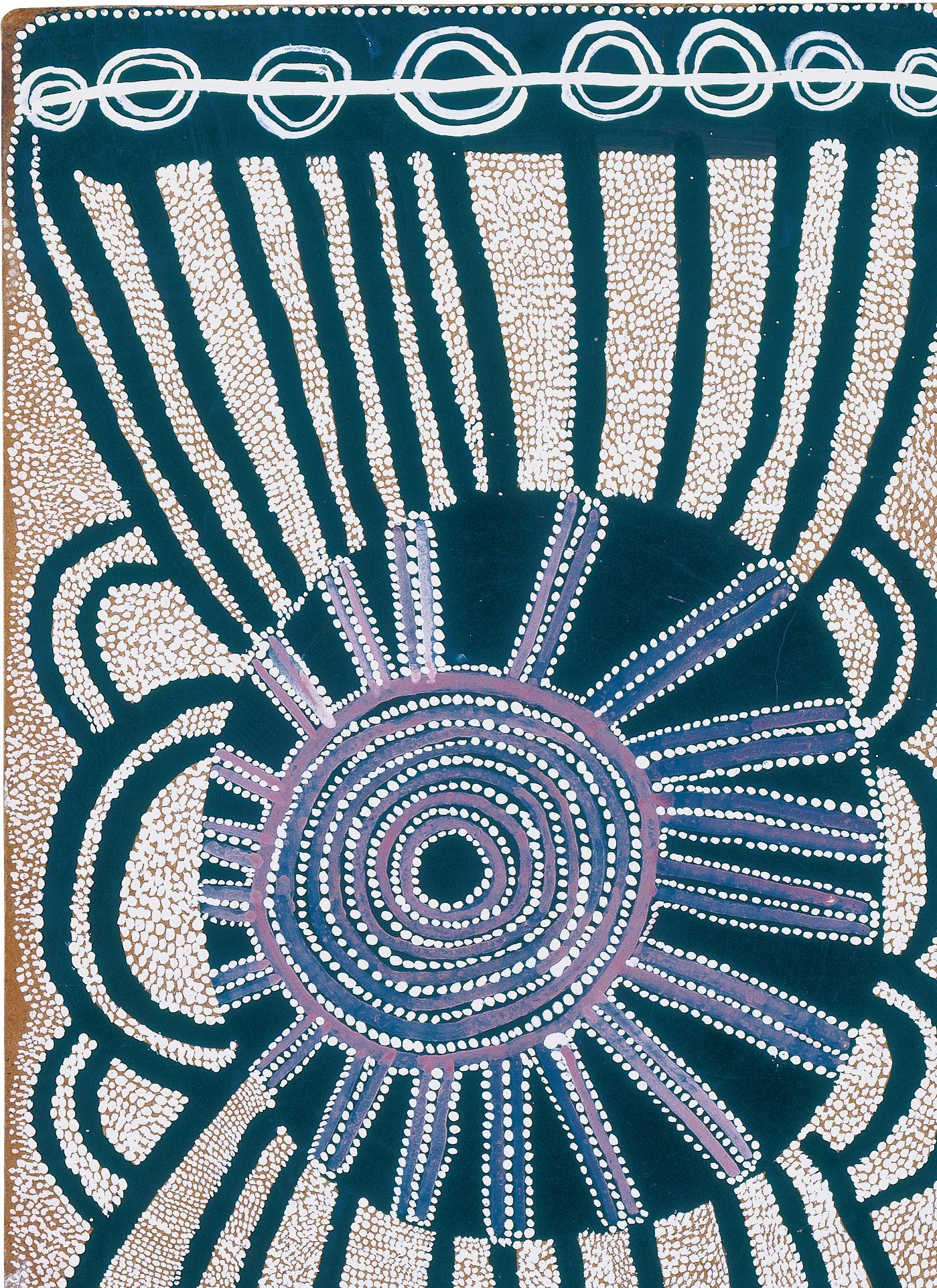
1 Five Banners Feinstein
2 When Monsters Speak Stryker
3 Blood Loss Lane
4 The Story of What Is Broken Is Whole Levins Morales
5 How We Write Now Nash
6 Learning to Lead Nájera
6 Open Admissions Savonick
7 Shadow of My Shadow Doyle
8 Selected Writings on Visual Arts and Culture Hall
8 On the Way to Theory Grossberg
9 .....And the Dogs Were Silent/…..Et les chiens se taisaient Césaire
9 Sovereignty and Extortion Lomnitz
10 Excited Delirium Beliso-De Jesús
11 Left Turns in Brown Study Ruiz
11 Impossible Things Oberman
12 Made in NuYoRico Negrón
12 Fitness Fiesta! Rivera Rideau
13 Bangtan Remixed Ahn, Cho, Gonzalez, Neutill, Nguyen, and Wong
14 Blues Mamas and Broadway Belters Asare
14 Fantasies of Nina Simone Stein
15 The Essential Jill Johnston Reader Johnston
15 Jill Johnston in Motion Croft
16 Momentum Katzenstein, del Carmen Carrión, and Turner
16 A Sense of Arrival Browne
17 Grime, Glitter, and Glass Greene
17 Heavyweight Saggese
18 Six Paintings from Papunya Myers and Smith
18 The Politics of Collecting Kim
19 Artist, Audience, Accomplice Stutterheim
19 Biennial Boom Checa-Gismero
20 Your History with Me Nuttall
20 Visual Disobedience Cornejo
21 Eternal Sovereigns Bell
21 Earth Diplomacy Horton
22 New Citizenship Studies Hyde and Spires
22 Ordinariness Barry
23 "Inside the Black (W)hole" Roach
23 Queering the Domestic Gutterman, Manalansan, and Vider
23 The Inaugural Issue Wilcox and Marchal
24 Transnational Feminist Vistas Candelario
24 Expansive Trajectories Martin
24 Revolutionary Papers Ahmad, Benson, and Morgenstern
25 The Promise of Beauty Nguyen
25 Indie Porn Stardust
26 Landbridge Troeung
27 Settler Militarism Nebolon
Evacuation Adey
Judicial Territory Potts
28 Sanctuary Everywhere Sostaita
Life beside Bars pearson
Poor Things Davis 30 Menace to the Future Whatcott
Erosion Caison
A Resonant Ecology Ritts
Eating Is an English Word Mol
33 The Inner Life of Race Medovoi 33 The Suicide Archive Calhoun 34 Dominican Crossroads Davidson
34 The Gospel of John Marrant Saville IV
35 The Second Battle for Africa McDuffie
36 Beyond Constraint Jackson
36 The Rule of Dons Jaffe
37 All of Us or None Das Gupta
37 Third World Studies Okihiro
38 Rio as Method Amar
38 Daughter, Mother, Grandmother, and Whore Leite
39 The Buenos Aires Reader Armus and Andrade 40 Forest Lost Greenleaf 40 Unsettled Labors Brown
41 After Palmares Hertzman
42 Survival of a Perverse Nation Shirinian
42 On Addiction Weinberg
43 The Banality of Good Faier
43 Ghostly Past, Capitalist Presence Bhattacharya
44 The Book of Politics Dutton
44 Reconfiguring Racial Capitalism Huang 45 Plantation Worlds Barua 45 State of Fear Barker 46 Infrastructural Attachments Park 46 Soldier's Paradise Daly 47 Reproductive Labor and Innovation Denbow
47 Laboratory Epistemologies Boulboullé
Journals 50 Selected Backlist 52 Selected Recent Award Winners
ii table
contents
of
27
28
31
29
30
31
32
ON THE COVER Wartuma (Charlie Tarawa/Tjaruru) Tjungurrayi, The Trial, 1972. © Estate of the artist licensed by Aboriginal Artists Agency Ltd. dukeupress.edu
48
Five Banners
Inside the Duke Basketball Dynasty
JOHN FEINSTEIN
"There is nobody better to chronicle Duke’s championship culture than John Feinstein. John has been close to Coach K and his program from Day One, and takes us all behind the scenes for each of Duke’s quintet of titles in Five Banners. Nobody captures the essence of sport better than John Feinstein, and he’s written another great one."— JAY BILAS, ESPN
On an early morning in 1983, after the worst loss of his career (109-66 against Virginia) amid the cries of powerful athletics boosters calling for him to be fired, Duke men’s basketball coach Mike Krzyzewski went to breakfast at 2:00 a.m. to vent with friends. Sports journalist and Duke alumnus John Feinstein was at the table. For Coach K, "the night at Denny’s” would mark a turning point in his career and for the team, and eight years later, the Blue Devils would win the first NCAA national championship in school history.
In Five Banners, Feinstein tells the inside history of Coach K’s forty-twoyear career at Duke and the five NCAA championships, from the first against Kansas in 1991 to the most recent in 2015 against Wisconsin. With unparalleled access to Coach K, the team, and its staff, Feinstein takes readers on a mesmerizing ride into the locker room and onto the court. Full of intimate details, personal memories, and previously untold on- and off-court stories, it is a book that only Feinstein could write.
Feinstein explores a basketball legacy that begins with his days as an undergrad Duke Chronicle reporter covering coaches Bucky Waters and Neill McGeachy (who went 12-26 in one year as head coach), includes the “drought years” of the 1980s, the glory of the teams of the 1990s, and moves into the present day with John Scheyer’s succession. Drawing on new interviews, Feinstein highlights the voices of Grant Hill, Nolan Smith, Christian Laettner, Tommy Amaker, and Bobby Hurley, who each bring new insights into the championship years.
Throughout, Feinstein unveils the momentous force of college basketball as a game of intense relationships and intimate conversations. Candid, revelatory, and engrossing, Five Banners is an essential book for all Duke fans and anyone who loves the college game.

October 200 pages, 16 color illustrations cloth, 978-1-4780-2671-6 $29.95tr/£25.99 Also of interest

The Encyclopedia of Duke Basketball
John Roth
cloth, $39.95tr/£36.00 978-0-8223-3904-5 / 2006
Available as an e-book
John Feinstein is the award-winning author of forty-nine books, including the #1 New York Times bestsellers A Season on the Brink and A Good Walk Spoiled He has contributed to the Washington Post, Sports Illustrated, Golf Digest, ESPN, Sirius XM Radio, National Public Radio, and the Golf Channel, among many other publications and media outlets. A member of six halls of fame, including The Naismith Basketball Hall of Fame, The National Sportswriters and Sportscasters Hall of Fame, and The U.S. Basketball Writers Hall of Fame, Feinstein currently does color commentary for Virginia Commonwealth University basketball, George Mason basketball, and the Navy radio network.
General interest/Sports
1

July 208 pages paper, 978-1-4780-3047-8 $25.95tr/£21.99 cloth, 978-1-4780-2625-9 $99.95/£90.00
Susan Stryker is Professor Emerita of Gender and Women’s Studies at the University of Arizona. She is the author of Transgender History and coeditor of The Transgender Studies Reader. McKenzie Wark is Professor of Culture and Media at The New School and the author of several books, including Raving and Philosophy for Spiders: On the Low Theory of Kathy Acker, both also published by Duke University Press.
When Monsters Speak
A Susan Stryker Reader
SUSAN STRYKER
Edited by MCKENZIE WARK
"Stryker provides a bracing assessment of frictions within the LGBTQ movement, criticizing cis gay and lesbian individuals who seek to secure a place in mainstream society by excluding trans people. . . . The result is a striking introduction to the work of an essential queer thinker."— Publishers Weekly
“Whenever Susan Stryker speaks, I listen. Stryker’s career is one of those that has altered the way that those of us who came after her think—and live our lives. We are so lucky to now have a collection that allows us to trace her thoughts over her own life.”—
TORREY
PETERS, author of Detransition, Baby
“Decades ago, the monster demanded a word with its creator, and thus was trans studies born. In these pages, trace years of intellectual labor without an academic job in queer San Francisco. Study the obligate fiction of a field’s birth. And surrender to the fear, then the pleasure, of challenging the surgeon in your head. Chase the experience, half psychedelic twinkle, half S/M ripple, of enacting theory in the flesh. Reading Susan Stryker, we are gloriously transformed.”—
JULES
GILL-PETERSON , author of Histories of the Transgender Child
Susan Stryker is a foundational figure in trans studies. When Monsters Speak showcases the development of Stryker’s writing from the 1990s to the present. It combines canonical pieces, such as “My Words to Victor Frankenstein,” with her hard to find earlier work published in zines and newsletters. Brought together, they ground Stryker’s thought in 1990s San Francisco and its innovative queer, trans, and S/M cultures. The volume includes an introduction by editor McKenzie Wark, who highlights Stryker’s connections to developments in queer theory, media studies, and autotheory while foregrounding Stryker’s innovative writing style and scholarly methods. When Monsters Speak is an authoritative and essential collection by one of the most important and influential intellectuals of our time.
ASTERISK: GENDER, TRANS-, AND ALL THAT COMES AFTER A series edited by Susan Stryker, Eliza Steinbock, and Jian Neo Chen
Trans studies
2
Blood Loss
A Love Story of AIDS, Activism, and Art KEIKO LANE
“Keiko Lane’s Blood Loss travels back through the heart of AIDS Activism with fierce love and a dazzling, devotional desire to bring the story back to life. What I found in these pages was history, memory, hope, fight, and a heart beating, not beaten. This book is a brilliant love letter to those we lost and a message for all of us who remember. We must keep telling the stories for those who carry on next.”
LIDIA YUKNAVITCH, author of The Chronology of Water
“Keiko Lane is a powerful writer and Blood Loss is especially notable for its perspective of a young Asian American queer woman AIDS activist. Lane describes a significant conflict in herself: between her duty to protest on behalf of others and her deeply ingrained cultural survival tactic of avoiding notice in order to avoid violence. Viscerally evocative on every page, Blood Loss is historically significant as a work of Asian American literature, women’s literature, and queer activist history.”
ALEXANDER CHEE , author of How to Write an Autobiographical Novel: Essays
In 1991, 16-year-old activist Keiko Lane joined the Los Angeles chapters of Queer Nation and ACT UP. They protested against legislation aimed at dismantling rights for LGBTQ people, people living with HIV, and immigrants, while fighting for needle exchange programs, reproductive justice, safer sex education, hospice funding, and the right to die with dignity. At the same time, they were a queer chosen family of friends and lovers who took care of one another in sickness and in health. Sometimes they helped each other die. By the time Lane turned 22, most of them had died of AIDS. In her evocative memoir, Lane weaves together the love stories and afterlives of queer resistance and survival, against the landscape of the Rodney King Rebellion, the movement for queer rights, and the censorship of queer artists and sexualities. Lane interrogates the social construction of power against and in queer communities of color, and the recovery of sexual agency in the midst and aftermath of violence. Luminous and powerfully moving, Blood Loss explores survival after those we love have died.

September 312 pages paper, 978-1-4780-3079-9 $26.95tr/£22.99 cloth, 978-1-4780-2655-6 $102.95/£92.00

Keiko Lane is an independent scholar and practicing psychotherapist.
Memoir/AIDS activism/Queer studies
3

November 448 pages paper, 978-1-4780-3093-5 $32.95tr/£27.99 cloth, 978-1-4780-2668-6 $119.95/£107.00
Aurora Levins Morales is a Puerto Rican Ashkenazi writer, activist, poet, and visual artist. She is the author of many books, including Medicine Stories: Essays for Radicals, also published by Duke University Press.
The Story of What Is Broken Is Whole
An Aurora Levins Morales Reader AURORA LEVINS MORALES
“The Story of What Is Broken Is Whole is cause for jubilation, finally bringing together in one volume over forty years of essays and poetry by one of the major poetic thinkers of our time. Aurora Levins Morales has long written from and about the many different forms her and our survival and liberation can and must take. To have all these stories in one volume, brilliantly edited and introduced by the author herself, is to be heartened and emboldened.”—
URAYOÁN NOEL , author of Transversal: Poems
The Story of What Is Broken Is Whole collects for the first time fifty years of writing by Puerto Rican Jewish feminist and radical thinker Aurora Levins Morales. Combining well-known excerpts from her books with out of print and harder to find ephemeral works and unpublished pieces, this collection weaves together stories of bodies, ecologies, indigeneity, illness, travel, sexuality, and more. As Levins Morales reflects on her use of storytelling as a tool for change, she gathers the threads of lives and places sacrificed to greed and extraction while centering care for our individual bodyminds and those of our kin, communities, and movements. This comprehensive and essential collection provides an unprecedented window into the breadth and depth of the work of one of the most significant thinkers of our time.
Women's studies
4
How We Write Now
Living with Black Feminist Theory
JENNIFER C. NASH
“Jennifer C. Nash’s brilliant monograph embraces what Christina Sharpe described as ‘beauty as a method’ through which she delivers stunning erudition and heart-rending intimacy with what it means to theorize Black life in the twenty-first century. Nash provides an essential Black feminist rejoinder to the orthodoxy of Afropessism by insisting that Black women refuse to be defined and dehumanized by Black death. Rather, their long history of cultivating beauty, intimacy, care, and affection is a fierce and rigorous practice of Black survival and enduring humanity.”—
TINA M. CAMPT, author of A Black Gaze: Artists Changing How We See
“Goodness, what a book: Jennifer C. Nash has managed to create work that is both urgent and also slow, ferocious, and quiet—which is to say that she has written a book that holds the world of ordinariness. Compellingly smart and beautifully written, How We Write Now is a transcendent read and an astonishing accomplishment that builds sublimely on Nash’s singular consideration of Black feminism’s affective work.”
KEVIN QUASHIE , author of Black Aliveness, or A Poetics of Being
In How We Write Now Jennifer C. Nash examines how Black feminists use beautiful writing to allow writers and readers to stay close to the field’s central object and preoccupation: loss. She demonstrates how contemporary Black feminist writers and theorists such as Jesmyn Ward, Elizabeth Alexander, Christina Sharpe, and Natasha Trethewey mobilize their prose to ask readers to feel, undo, and reassemble themselves. These intimate invitations are more than a set of tools for decoding the social world; Black feminist prose becomes a mode of living and feeling, dreaming and being, and a distinctly affective project that treats loss as not only paradigmatic of Black life, but also an aesthetic question. Through her own beautiful writing, Nash shows how Black feminism offers itself as a companion to readers to chart their own lives with and in loss, from devastating personal losses to organizing around the Movement for Black Lives. Charting her own losses, Nash reminds us that even as Black feminist writers get as close to loss as possible, it remains a slippery object that troubles memory and eludes capture.
BLACK FEMINISM ON THE EDGE
A series edited by Jennifer C. Nash and Samantha Pinto
August 152 pages, 1 illustration paper, 978-1-4780-3046-1 $24.95/£21.99 cloth, 978-1-4780-2623-5 $94.95/£85.00
Jennifer C. Nash is Jean Fox O’Barr Professor of Gender, Sexuality, and Feminist Studies at Duke University and author of Birthing Black Mothers, Black Feminism Reimagined: After Intersectionality, and The Black Body in Ecstasy: Reading Race, Reading Pornography, all also published by Duke University.
Black feminist theory
5
October 192 pages, 10 illustrations paper, 978-1-4780-3053-9 $25.95/£21.99 cloth, 978-1-4780-2630-3 $99.95/£90.00
Learning to Lead
Undocumented Students Mobilizing Education
JENNIFER R. NÁJERA
In Learning to Lead, Jennifer R. Nájera explores the intersections of education and activism among undocumented students at the University of California, Riverside. Taking an expansive view of education, Nájera shows how students’ experience in college—both in and out of the classroom—can affect their activism and advocacy work. Students learn from their families, communities, peers, and student and political organizations. In these different spaces, they learn how to navigate community and college life as undocumented people. Students are able to engage campus organizations where they can cultivate their leadership skills and—importantly—learn that they are not alone. These students embody and mobilize their education through both large and small political actions such as protests, workshops for financial aid applications, and Know Your Rights events. As students create community with each other, they come to understand that their individual experiences of illegality are part of a larger structure of legal violence. This type of education empowers students to make their way to and through college, change their communities, and ultimately assert their humanity.
Jennifer R. Nájera is Associate Professor of Ethnic Studies at the University of California, Riverside, and author of The Borderlands of Race: Mexican Segregation in a South Texas Town
Feminism/Higher education/Literature
Open Admissions
August 264 pages
paper, 978-1-4780-3061-4 $27.95/£23.99
cloth, 978-1-4780-2637-2 $104.95/£94.00
The Poetics and Pedagogy of Toni Cade Bambara, June Jordan, Audre Lorde, and Adrienne Rich in the Era of Free College DANICA SAVONICK
In Open Admissions Danica Savonick traces the largely untold story of the teaching experience of Toni Cade Bambara, June Jordan, Audre Lorde, and Adrienne Rich at the City University of New York (CUNY) in the late 1960s and early 1970s. This period, during which CUNY guaranteed tuition-free admission to every city high school graduate, was one of the most controversial moments in US educational history. Analyzing their archival teaching materials—syllabi, lesson plans, and assignments—alongside their published work, Savonick reveals how these renowned writers were also transformative teachers who developed creative methods of teaching their students both to navigate and change the world. In fact, many of their methods, such as student-led courses, collaborative public projects, and the publication of student writing, anticipated the kinds of student-centered and antiracist pedagogies that have become popular in recent years. In addition to recovering the pedagogical legacy of these writers, Savonick shows how teaching in CUNY’s free and open classrooms fundamentally altered their writing and, with it, the course of American literature and feminist criticism.
Danica Savonick is Assistant Professor of English at State University of New York at Cortland.
Ethnic studies/Anthropology/Education
6
Shadow of My Shadow
JENNIFER DOYLE
“Jennifer Doyle’s Shadow of My Shadow rigorously inhabits and analyzes places that many of us feel averse to, but that structure and shape our institutions and sometimes our greater lives. The result is a probing, risk-taking, distinctive study that aids its readers in better understanding ‘complaint pathology and the paranoid character of nearly all discourse about harassment’ as well as helping us fathom ‘what we lose when harassment ecologies consume us’—and what we might gain by living elsewise.”—
MAGGIE NELSON,
author of Like Love: Essays and Conversations
“Shadow of My Shadow sets a new bar for autotheory. A patient, granular dismantling of the chilling relations between work, sex, and institutions—and of their systemic disavowal. With her signature generosity of thought, unflinching attention to difficult details, and riveting writing that is at turns revelatory and crushing, Jennifer Doyle has crafted a stunning, exquisite work.”—
JASBIR K.
PUAR , author of The Right to Maim: Debility, Capacity, Disability
Over the course of two years, Jennifer Doyle filed multiple harassment complaints with her campus’s Title IX office and one with the Department of Labor. Her experiences with these complaints and how they subsequently impacted her life have led to this book, Shadow of My Shadow. Doyle tells her personal story, sharing how she lost her sense of voice, felt exposed at work, became distrustful of students and colleagues, and was consumed by grief. Working across autobiography, literary criticism, an analysis of the Larry Nassar Title IX case, and larger institutional critique of harassment administration, Doyle shows that harassment is both intimate, dynamic, and intensely social, flourishing in neglected social spaces. In her own case, it profoundly reshaped her relationship to her work, writing, and ultimately to herself. As Doyle explains, the experience drew out the distance between herself in the world and herself on the page. This book is her effort to understand and repair that breach and to consider how loss and grief can be sources of insight and compassion.
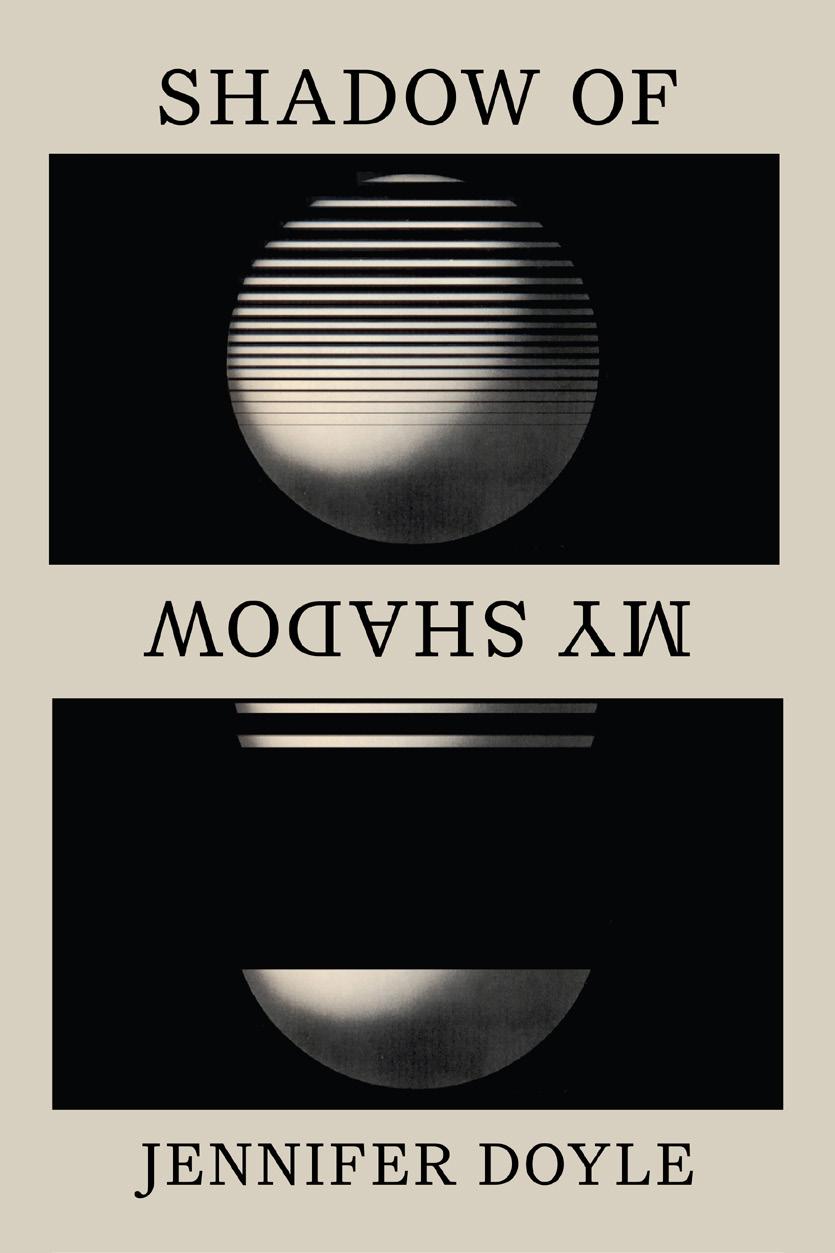
August 184 pages paper, 978-1-4780-3066-9 $25.95/£21.99 cloth, 978-1-4780-2642-6 $99.95/£90.00
Jennifer Doyle is Professor of English at the University of California, Riverside, and author of Hold It Against Me: Difficulty and Emotion in Contemporary Art, also published by Duke University Press and Campus Sex, Campus Security.
Also by Jennifer Doyle

Hold It Against Me
Difficulty and Emotion in Contemporary Art paper, $26.95tr/£22.99 978-0-8223-5313-3 / 2013
Feminist studies
7

August 392 pages, 64 color illustrations paper, 978-1-4780-3033-1 $30.95/£26.99 cloth, 978-1-4780-2610-5 $114.95/£103.00
Art/Cultural studies/Black studies
Selected Writings on Visual Arts and Culture
Detour to the Imaginary
STUART HALL
Edited by GILANE TAWADROS
Stuart Hall’s work on culture, politics, race, and media are familiar to readers throughout the world. Equally important was his decades long commitment to visual art. As the first collection to bring together Hall’s work on the visual, this volume assembles more than two dozen of Hall’s essays, lectures, reviews, catalog texts, and conversations on art, film, and photography. Providing rare insights into Hall’s engagement with the “radically different” intellectual and aesthetic space of the visual imaginary, these works articulate the importance of the visual as a site of contestation at the same time as being a space in which black artists and filmmakers re-frame questions about diaspora, identity, and globalization. Selected Writings on Visual Arts and Culture demonstrates the breadth and range of Hall’s thinking on art, film, photography, archives, and museums. In so doing, it enables us to arrive at radical and innovative ways of understanding the world.
STUART HALL: SELECTED WRITINGS
A series edited by Catherine Hall and Bill Schwarz
Stuart Hall (1932–2014) was one of the most prominent and influential scholars and public intellectuals of his generation. Hall taught at the University of Birmingham and the Open University, was the founding editor of New Left Review, and was the author of Cultural Studies 1983: A Theoretical History, Familiar Stranger: A Life between Two Islands, and other books also published by Duke University Press. Gilane Tawadros is Director of the Whitechapel Gallery, Chair of the Stuart Hall Foundation, and author of The Sphinx Contemplating Napoleon: Global Perspectives on Contemporary Art and Difference.

October 512 pages, 27 illustrations paper, 978-1-4780-3085-0 $33.95/£28.99 cloth, 978-1-4780-2663-1 $124.95/£112.00
Theory/Cultural studies/Philosophy
On the Way to Theory
LAWRENCE GROSSBERG
In On the Way to Theory, Lawrence Grossberg introduces the major ways of thinking that provide the backstory for contemporary Western theory. Asking readers to think about thinking, Grossberg traces cultural and critical theory’s foundations from the contested enlightenments to modern and postmodern conceptualizations of power, experience, language, and existence. He introduces key figures as historical characters and lays out the unique set of tools for thought that their “deep theories” offer. Through finely tuned and accessible descriptions of their concepts and logics, Grossberg highlights thinkers including Spinoza, Kant, Hegel, Marx, Nietzsche, Wittgenstein, Heidegger, Derrida, Foucault, Deleuze, Hall, defining the possibilities of their thought. This book is essential for those interested in how theories shape our understanding of the world, influence our choices, and define our realities. It challenges us to recognize the multiplicity and complexities of ways of thinking in our quest for knowledge and understanding. By setting out a story of theoretical foundations, Grossberg invites readers to think toward the future of theory and expand conversations around theoretical scrutiny and criticism.
Lawrence Grossberg is Distinguished Professor Emeritus of Communication at the University of North Carolina at Chapel Hill and the author and editor of numerous books, including Cultural Studies 1983, Cultural Studies in the Future Tense, Bringing it all Back Home, and Dancing in Spite of Myself, all also published by Duke University Press.
8
Literature/Caribbean studies/Black diaspora
.....And the Dogs Were Silent/…..Et les chiens se taisaient
AIMÉ CÉSAIRE
Translated and with an introduction by ALEX GIL with a foreword by BRENT HAYES EDWARDS
Available to readers for the first time, Aimé Césaire’s three-act drama .....And the Dogs Were Silent dramatizes the Haitian Revolution and the rise and fall of Toussaint Louverture as its heroic leader. This bilingual English and French edition—written during the Vichy regime in Martinique in 1943—was lost until 2008 and stands apart from Césaire’s more widely known 1946 closet drama. Following the slave revolts that sparked the revolution, Louverture arrives as both prophet and poet, general and visionary. With striking dramatic technique, Césaire retells the revolution in poignant encounters between rebels and colonial forces, guided by a prophetic chorus and Louverture’s steady ethical and political vision. In the last act, we reach the hero’s betrayal, imprisonment, and his last stand against the lures of compromise. Césaire’s masterwork is a strikingly beautiful and brutal indictment of colonial cruelty and an unabashed celebration of Black rebellion and victory.
Aimé Césaire (1913–2008) was a Martinican poet, critic, essayist, playwright, and statesman; a founder of the Négritude movement; and one of the most influential Francophone Caribbean intellectuals of the twentieth century. He is the author of Journal of a Homecoming/Cahier d’un retour au pays natal, also published by Duke University Press. Alex Gil is Senior Lecturer II and Associate Research Faculty of Digital Humanities in the Department of Spanish and Portuguese at Yale University. Brent Hayes Edwards is Peng Family Professor of English and Comparative Literature at Columbia University.
Political theory/Anthropology/Mexico
Sovereignty and Extortion
A New State Form in Mexico
CLAUDIO LOMNITZ
Over the past fifteen years in Mexico, over 450,000 people have been murdered and 110,000 more have been disappeared. In Sovereignty and Extortion, Claudio Lomnitz examines the Mexican State in relation to this extreme violence, uncovering a reality that challenges the familiar narratives of “a war on drugs” or a “failed state.” Tracing how neoliberal reforms, free trade agreements, and a burgeoning drug economy have shaped Mexico’s socio-political landscape, Lomnitz shows that the current crisis does not represent a tear in the social fabric. Rather, it reveals a fundamental shift in the relationship between the state and the economy in which traditional systems of policing, governance, and the rule of law have eroded. Lomnitz finds that power is now concentrated in the presidency and enforced through militarization, which has left the state estranged from itself and incapable of administering justice or regaining control over violence. Through this critical examination, Lomnitz offers a new theory of the state, its forms of sovereignty, and its shifting relation to capital and militarization.
PUBLIC PLANET BOOKS
A series edited by Dilip Parameshwar Gaonkar, Jane Kramer, Benjamin Lee, and Michael Warner
Claudio Lomnitz is Campbell Family Professor of Anthropology at Columbia University and the author of several books, including Nuestra América: Family in the Vertigo of Translation, The Return of Comrade Ricardo Flores Magón, and Death and the Idea of Mexico

August 320 pages, 2 illustrations paper, 978-1-4780-3064-5 $28.95tr/£24.99 cloth, 978-1-4780-2641-9 $107.95/£97.00
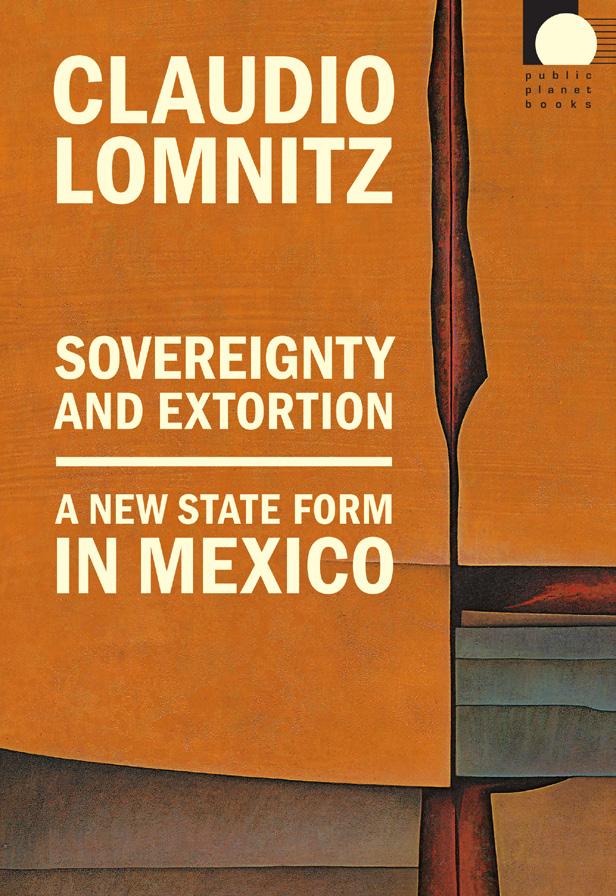
August 240 pages, 1 illustration paper, 978-1-4780-3073-7 $26.95/£22.99 cloth, 978-1-4780-2649-5 $102.95/£92.00
9

August 320 pages, 2 illustrations paper, 978-1-4780-3055-3 $28.95tr/£24.99 cloth, 978-1-4780-2632-7 $107.95/£97.00

Aisha M. Beliso-De Jesús is Olden Street Professor of American Studies at Princeton University and author of Electric Santería: Racial and Sexual Assemblages of Transnational Religion
Excited Delirium
Race, Police Violence, and the Invention of a Disease AISHA
M. BELISO-DE JESÚS
“At once painful, intimate, and full of insight, Aisha M. Beliso-De Jesús’s powerful book sits at the intersection of memoir, anthropology, and religious studies. The spirits have guided her pen to offer a prayer that exposes the lie of ‘excited delirium syndrome,’ and, hopefully, will help in the collective undoing of police violence in this country.”—
EDDIE S. GLAUDE JR., author of Begin Again: James Baldwin's America and Its Urgent Lessons for Our Own
“An unflinching tour de force, Excited Delirium casts a stark light on the shadows where racism, medicine, and systemic injustice meet. With meticulous research and exquisite prose, leading anthropologist Aisha M. Beliso-De Jesús challenges readers to confront uncomfortable truths and the ways science is manipulated to advance narratives of power and social control—in this case, through a fictitious syndrome that has justified the deaths of Black and Brown people during encounters with law enforcement. This groundbreaking book is a must-read for anyone seeking to understand the full implications of race and policing in America, illuminating a history that is as enlightening as it is urgent. Beliso-De Jesús’s critical work stands as a beacon in the ongoing discussion on police violence, demanding attention, reflection, and, ultimately, action.”— ELIZABETH HINTON, author of America on Fire: The Untold History of Police Violence and Black Rebellion Since the 1960s
In 1980, Miami-based medical examiner and self-proclaimed “cult expert” of Afro-Caribbean religions Charles Wetli identified what he called “excited delirium syndrome.” Soon, medical examiners began using the syndrome regularly to describe the deaths of Black men and women during interactions with police. Police and medical examiners claimed that Black people with excited delirium exhibited superhuman strength induced from narcotics abuse. It was fatal heart failure that killed them, examiners said, not forceful police restraints. In Excited Delirium, Aisha M. Beliso-De Jesús examines this fabricated medical diagnosis and its use to justify and erase police violence against Black and Brown communities. Exposing excited delirium syndrome’s flawed diagnostic criteria, she outlines its inextricable ties to the criminalization of Afro-Latiné religions. Beliso-De Jesús demonstrates that it is yet a further example of the systemic racism that pervades law enforcement in which the culpability for state violence is shifted from the state onto its victims. In so doing, she helps to further understand the complex layers of medicalized state-sanctioned violence against people of color in the United States.
Anthropology/Religion/Policing
10
Poetry
Left Turns in Brown Study
SANDRA RUIZ
In Left Turns in Brown Study Sandra Ruiz offers a poetic-theoretical inquiry into the interlacing forms of study and mourning. Drawing on Black and Brown activism and theory, Ruiz interweaves poetry, memoir, lyrical essay, and vignettes to examine study as an emancipatory practice. Proposing “brown study” as key for understanding how Brownness harbors loss and suffering along with the possibility for more abundant ways of living, Ruiz invites readers to turn left into the sounds, phrases, and principles of anticolonial ways of reading, writing, citing, and listening. In doing so, Ruiz engages with a panoply of hauntings, ghosts, and spectral presences, from deceased teachers, illiterate ancestors, and those lost to unnatural disasters to all those victims of institutional and colonial violence. Study is shared movement and Brownness lives in citation. Conceptual, poetic, and unconventional, this book is crucial for all those who theorize minoritarian literary aesthetics and think through utopia, queer possibility, and the entwinement of forms.
WRITING MATTERS!
A series edited by Alexis Pauline Gumbs, Monica Huerta, Erica Rand, and Jerry Zee
Sandra Ruiz is Sue Divan Associate Professor of Performance Studies in Theatre and English at the University of Illinois Urbana-Champaign and author of Ricanness: Enduring Time in Anticolonial Performance
Poetry
Impossible Things
MILLER OBERMAN
Offering an intimate account of intergenerational grief, Miller Oberman’s new collection of poetry, Impossible Things, explores his experiences as both a transgender child and father. Oberman weaves in passages from his own deceased father’s unpublished memoir to engage with the mysterious drowning of his eldest brother Joshua at age two, a tragedy that cast a shadow over his childhood. He depicts his own youth and parenthood in the context of his father’s trauma, employing queer and trans theory and experimental poetic forms to challenge and expand discourse around fatherhood and masculinity. Oberman moves beyond an attempt to solve the mystery of Joshua’s death and interrogates how much we can ever know our forebears or understand their impacts on our lives. Impossible Things offers a necessary intervention into the well-worn terrain of fatherhood/boyhood memoir and functions as a living elegy, communicating with the past, the dead, and the unknowable while speaking to the possibilities for healing intergenerational trauma.

Miller Oberman is Director of First Year Writing at Eugene Lang College, The New School, and author of The Unstill Ones: Poems August 152 pages paper, 978-1-4780-3012-6 $24.95/£21.99 cloth, 978-1-4780-2586-3 $94.95/£85.00

October 120 pages paper, 978-1-4780-3109-3 $23.95tr/£20.99 cloth, 978-1-4780-2686-0 $89.95/£81.00
and Poetics/Latinx studies/Queer studies
11
October 352 pages, 31 illustrations paper, 978-1-4780-3089-8 $29.95/£25.99 cloth, 978-1-4780-2666-2 $109.95/£98.00
Music/Latinx studies/Cultural studies
Made in NuYoRico
Fania Records, Latin Music, and Salsa’s Nuyorican Meanings
MARISOL NEGRÓN
In Made in NuYoRico, Marisol Negrón tells the cultural history of salsa that traces the music’s Nuyorican meanings over a fifty-year period that begins with the establishment of Fania Records in 1964 and how it capitalized on salsa’s Nuyorican imaginary to cultivate a global audience. Drawing on interviews with fans, legendary musicians, and music industry figures as well as analyses of songs, albums, film, and archival documents, Negrón shows how Nuyorican cultural and social histories became embedded in salsa during its foundational period of the mid-1960s and its boom in the 1970s and impacted the music’s flows. Salsa’s Nuyorican aesthetics challenged mainstream notions of Americanness and Puerto Ricanness and produced an alternative public sphere through which New York’s poor and working-class Puerto Ricans could contest racialization and colonial power. By outlining salsa’s complicated musical, cultural, commercial, racial, gendered, legal, and political entanglements, Negrón demonstrates its centrality to Nuyorican identity and subjectivity.
REFIGURING AMERICAN MUSIC
A series edited by Ronald Radano, Josh Kun, and Nina Sun Eidsheim
Marisol Negrón is Assistant Professor of American Studies and Latino Studies at the University of Massachusetts Boston.
Latinx studies/American studies
Fitness Fiesta!
September 248 pages, 20 illustrations paper, 978-1-4780-3081-2 $26.95/£22.99
cloth, 978-1-4780-2657-0 $102.95/£92.00
Selling Latinx Culture through Zumba PETRA R. RIVERA-RIDEAU
As a fitness brand, Zumba Fitness has cultivated a devoted fan base of fifteen million participants spread across 180 countries. In Fitness Fiesta! Petra R. Rivera-Rideau analyzes how Zumba uses Latin music and dance to create and sell a vision of Latinness that’s tropical, hypersexual, and party-loving. Rivera-Rideau focuses on the five tropes that the Zumba brand uses to create this Latinness: authenticity, fiesta, fun, dreams, and love. Closely examining videos, ads, memes, and press coverage as well as interviews she conducted with instructors, Rivera-Rideau traces how Zumba Fitness constructs its ideas of Latinx culture by carefully balancing a longing for apparent authenticity with a homogenization of a marketable “south of the border”-style vacation. She shows how Zumba Fitness claims to celebrate Latinx culture and diversity while it simultaneously traffics in the same racial and ethnic stereotypes that are used to justify racist and xenophobic policies targeting Latinx communities in the United States. In so doing, Rivera-Rideau demonstrates not only the complex relationship between Latinidad and neoliberal, postracial America, but what that means for the limits and possibilities of multicultural citizenship today.
Petra R. Rivera-Rideau is Associate Professor of American Studies at Wellesley College and author of Remixing Reggaetón: The Cultural Politics of Race in Puerto Rico, also published by Duke University Press.
12
Bangtan Remixed
A Critical BTS Reader
PATTY AHN, MICHELLE CHO, VERNADETTE VICUÑA
GONZALEZ, RANI NEUTILL, MIMI THI NGUYEN, and YUTIAN WONG, editors
"Equal parts fan letter, manifesto, and critical research essay, Bangtan Remixed is a work of care and collectivity. Assembled by an impressive squad of queer and feminist scholars and writers who are also unabashed ARMY, the book helps us listen and think differently about BTS by starting from the radical premise that the best music writing can (and should!) be prompted by deep feeling and pleasure."
CHRISTINE BACAREZA BALANCE , author of Tropical Renditions: Making Musical Scene in Filipino America
Bangtan Remixed delves into the cultural impact of celebrated K-Pop boy band BTS, exploring their history, aesthetics, fan culture, and capitalist moment. The collection’s contributors—who include artists, scholars, journalists, activists, and fans—approach BTS through inventive and wide-ranging transnational perspectives. From tracing BTS’s hip hop genealogy to analyzing how the band’s mid-2020 album reflects the COVID-19 pandemic to demonstrating how Baroque art history influences BTS’s music videos, the contributors investigate BTS’s aesthetic heritage. They also explore the political and technological dimensions of BTS’s popularity with essays on K-Pop and BTS’s fan culture as frontiers of digital technology, the complex relationship between BTS and Blackness, the impact of anti-Asian racism on BTS’s fandom, and the challenges BTS poses to conservative norms of gender and sexuality. Bangtan Remixed shows how one band can inspire millions of fans and provide a broad range of insights into contemporary social and political life.
Contributors Andrea Acosta, Patty Ahn, Carolina Alves, Inez Amihan Anderson, Allison Anne Gray Atis, Kaina “Kai” Bernal, Mutlu Binark, Jheanelle Brown, Sophia Cai, Michelle Cho, Mariam Elba, Ameena Fareeda, Vernadette Vicuña Gonzalez, Rosanna Hall, Dal Yong Jin, Jin Youngsun, Despina Kakoudaki, Yuni Kartika, Alptekin Keskin, Rachel Kuo, Marci Kwon, Courtney Lazore, Regina Yung Lee, S. Heijin Lee, Wonseok Lee, Amanda Lovely, Melody Lynch-Kimery, Maria Mison, Noel Sajid I. Murad, Sara Murphy, UyenThi Tran Myhre, Rani Neutill, Johnny Huy Nguyen, Mimi Thi Nguyen, Karlina Octaviany, Nykeah Parham, Stefania Piccialli, Raymond San Diego, Hannah Ruth L. Sison, Prerna Subramanian, Havannah Tran, Andrew Ty, Gracelynne West, Yutian Wong, Jaclyn Zhou
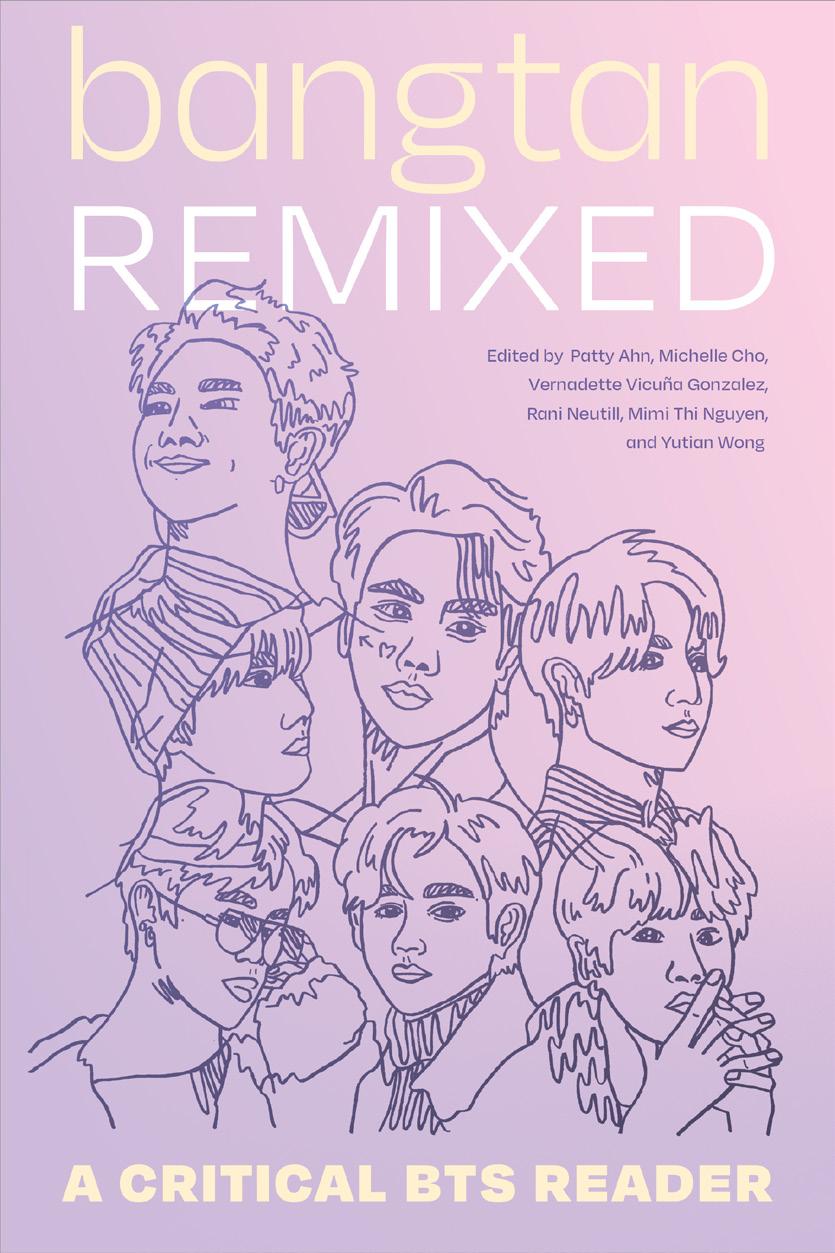
August 432 pages, 48 illustrations, including 15 in color paper, 978-1-4780-3062-1 $31.95tr/£27.99 cloth, 978-1-4780-2638-9 $117.95/£106.00

Patty Ahn is Associate Teaching Professor of Communication at the University of California, San Diego. Michelle Cho is Assistant Professor of East Asian Studies and Cinema Studies at the University of Toronto. Vernadette Vicuña Gonzalez is Professor of Ethnic Studies and Asian American and Asian Diaspora Studies at the University of California, Berkeley. Rani Neutill is Affiliate Faculty of Writing, Literature, and Publishing at Emerson College and Lecturer of English at Tufts University. Mimi Thi Nguyen is Associate Professor of Gender and Women’s Studies at the University of Illinois, Urbana-Champaign. Yutian Wong is Professor of Theatre and Dance at San Francisco State University.
Popular music/Media studies/Cultural studies
13
October 304 pages, 18 illustrations paper, 978-1-4780-3095-9 $27.95/£23.99 cloth, 978-1-4780-2673-0 $104.95/£94.00
Music/African American studies/Theater and performance
Blues Mamas and Broadway Belters
Black Women, Voice, and the Musical Stage MASI ASARE
In Blues Mamas and Broadway Belters, songwriter, scholar, and dramatist Masi Asare explores the singing practice of Black women singers in US musical theatre between 1900 and 1970. Asare shows how a vanguard of Black women singers including Gertrude “Ma” Rainey, Bessie Smith, Ethel Waters, Pearl Bailey, Juanita Hall, Lena Horne, Eartha Kitt, Diahann Carroll, and Leslie Uggams create a lineage of highly trained and effective voice teachers whose sound and vocal techniques continue to be heard today. Challenging pervasive narratives that these and other Black women possessed “untrained” voices, Asare theorizes singing as a form of sonic citational practice—how the sound of the teacher’s voice lives on in the student’s singing. From vaudeville-blues shouters, black torch singers, and character actresses to nightclub vocalists and Broadway glamour girls, Asare locates Black women of the musical stage in the context of historical voice pedagogy. She invites readers to not only study these singers, but to study with them—taking seriously what they and their contemporaries have taught about the voice. Ultimately, Asare speaks to the need to feel and hear the racial history in contemporary musical theatre.
REFIGURING AMERICAN MUSIC
A series edited by Ronald Radano, Josh Kun, and Nina Sun Eidsheim
DUKE UNIVERSITY PRESS SCHOLARS OF COLOR FIRST BOOK AWARD
Masi Asare is Assistant Professor of Theatre at Northwestern University and a Tony Award–nominated Broadway songwriter and dramatist.

September 320 pages, 32 illustrations paper, 978-1-4780-3070-6 $28.95/£24.99 cloth, 978-1-4780-2647-1 $107.95/£97.00
Music/African American studies
Fantasies of Nina Simone
JORDAN ALEXANDER STEIN
Since her death in 2003, Nina Simone has been the subject of an astonishing number of rereleased, remastered, and remixed albums and compilations as well as biographies, films, viral memes, samples, and soundtracks. In Fantasies of Nina Simone, Jordan Alexander Stein uses an archive of Simone’s performances, images, and writings to examine the space between our collective and individual fantasies about Simone the performer, Civil Rights activist, and icon, and her own fantasies about herself. Stein outlines how Simone gave voice to personal fantasies through the dozens of cover songs that she released of her white male contemporaries such as George Harrison, the Bee Gees, and Bob Dylan. With these covers, Simone explored and claimed the power and perspective that comes with race and gender privilege. Looking at examples from Simone’s four-decade, genre-bending, career— from songbook standards, jazz, and pop to folk, junkanoo, and reggae—and at her work’s many uptakes and afterlives, Stein mobilizes the psychoanalytic concept of fantasy to build a black feminist history with and for this multifaceted performing artist.
Jordan Alexander Stein is Professor of English and Comparative Literature at Fordham University and author of When Novels Were Books and Avidly Reads Theory
14
The Essential Jill Johnston Reader
JILL JOHNSTON
Edited by CLARE CROFT
Jill Johnston began the 1960s as an influential dance columnist for the Village Voice and by the start of the next decade she was known as a keen observer of postmodern art and lesbian feminist life who challenged how dance, art, and women can and should be seen. The Essential Jill Johnston Reader collects dozens of pieces of her writing from across her career. These writings—many of which appeared in the Village Voice and the New York Times—survey the breadth of her work, braiding together her thinking, writing, and activism. From personal essays, travel writing, and artist profiles to dance and visual art reviews as well as her infamous series of columns for the Voice in which she came out as a lesbian, these pieces demonstrate the evolution of her philosophies and writing style. Illustrating how Johnston drew on lessons from dance to reconsider what it means to be a woman, this collection brings a fascinating and brilliant voice of American arts criticism, radical feminism, and gay liberation back to contemporary audiences.
Jill Johnston (1929–2010) was a dance, arts, and literary critic and feminist activist whose books include Marmalade Me, Lesbian Nation: The Feminist Solution, and Jasper Johns: Privileged Information Clare Croft is Associate Professor of American Culture at the University of Michigan and author of Jill Johnston in Motion: Dance, Writing, and Lesbian Life, also published by Duke University Press.
Performance studies/Gender studies/Dance studies
Jill Johnston in Motion
Dance, Writing, and Lesbian Life
CLARE CROFT
Performer, activist, and writer Jill Johnston was a major queer presence in the history of dance and 1970s feminism. She was the first critic to identify postmodernism’s arrival in American dance and was a fierce advocate for the importance of lesbians within feminism. In Jill Johnston in Motion, Clare Croft tracks Johnston’s entwined innovations and contributions to dance and art criticism and activism. She examines Johnston’s journalism and criticism—in particular her Village Voice columns published between 1960 and 1980— and her books of memoir and biography. At the same time, Croft attends to Johnston’s appearances as both dancer and audience member and her physical and often spectacular appearances at feminist protests. By bringing together Johnston’s criticism and activism, her writing and her physicality, Croft emphasizes the effect that the arts, particularly dance, had on Johnston’s feminist thinking in the 1970s and traces lesbian feminism’s roots in avant garde art practice.
Clare Croft is Associate Professor of American Culture at the University of Michigan, author of Dancers as Diplomats: American Choreography in Cultural Exchange, and editor of Queer Dance: Meanings and Makings.

October 296 pages, 1 illustration paper, 978-1-4780-3090-4 $27.95tr/£23.99 cloth, 978-1-4780-2667-9 $104.95/£94.00

and Lesbian Life
October 264 pages, 17 illustrations paper, 978-1-4780-3105-5 $27.95/£23.99 cloth, 978-1-4780-2680-8 $104.95/£94.00
Art & performance/Feminism
Jill Johnston in Motion
15
Clare Croft Dance, Writing,
December 304 pages, 100 illustrations, including 50 in color paper, 978-1-63345-148-3 $45.00tr/£40.00
Published by the Museum of Modern Art and distributed by Duke University Press
Art and visual culture/Latin American studies/Environmental humanities
Momentum
Art
and Ecology in Contemporary Latin America
INÉS KATZENSTEIN, MARÍA DEL CARMEN CARRIÓN,
and MADELINE MURPHY TURNER, editors
Momentum: Art and Ecology in Contemporary Latin America is a guide to understanding the relationships between art and ecology, focusing on the unique contributions of Latin America, presented through the perspectives of artists, art historians, curators, and intellectuals. The culmination of three years of research produced through conferences, and research seminars conducted by the Cisneros Institute at The Museum of Modern Art, New York, this anthology underscores the significance of artistic practices that engage with the natural environment in Latin America. The book includes discussions of how artists imagine innovative relationships with the non-human; how they reflect critically on land disputes and colonial legacies; and how they envision the future—with new commissioned texts on key artists that pioneered an ecological approach from the sixties onward, including Cecilia Vicuña, the artists connected to the Centro de Arte y Comunicación (CAYC), Frans Krajcberg, and Juan Downey, along with essays on a number of contemporary artists and collectives from across the region. The book also includes reprints of texts by anthropologists, indigenous activists, and architects, which help frame the artistic contributions within a larger cultural and political discussion.
Inés Katzenstein is Curator of Latin American Art and Director of the Patricia Phelps de Cisneros Research Institute at The Museum of Modern Art, New York. María del Carmen Carrión is Project Manager of the Cisneros Institute at MoMA. Madeline Murphy Turner is a former fellow of the Cisneros Institute, currently the Emily Rauh Pulitzer Curatorial Fellow in Contemporary Drawings at the Harvard Art Museums.

Black studies/Art
A Sense of Arrival
KEVIN ADONIS BROWNE
In A Sense of Arrival, Kevin Adonis Browne blends literary, visual, and material forms to present a narrative of Caribbean Blackness. Arguing that the story of Caribbeanness cannot be told through words alone, Browne interweaves essays, memoir, autotheory, and narrative verse with documentary photography, portraiture, Rorschach blots, and images of his own sculptures and art installations. Browne labels this multimodal approach and rhetorical form “Caribbean Nonfiction,” and he uses it to conceptualize arrival as a theory of being. Arrival is practiced through forms of status, return, belonging, nomadism, self-exile, love, loss, presence, and haunting, each of which expresses the vast complexity and urgency of Caribbeanness. At the same time, arrival emphasizes and extends Caribbean ways of being, knowing, and doing. Throughout, Browne challenges readers to follow the archipelagic sensibilities of the Caribbean to look beyond Black death and apprehend the inherent optimism and beauty of arrival. A singular meditation on the art and process of Caribbeanness, A Sense of Arrival is a statement on how the Black Caribbean self comes to be.
Kevin Adonis Browne is Associate Professor of Rhetoric at Syracuse University and author of Tropic Tendencies: Rhetoric, Popular Culture, and the Anglophone Caribbean and High Mas: Carnival and the Poetics of Caribbean Culture. November 432 pages, 169 color illustrations paper, 978-1-4780-3092-8 $32.95/£27.99 cloth, 978-1-4780-2670-9 $119.95/£107.00
16
Grime, Glitter, and Glass
The Body and the Sonic in Contemporary Black Art
NIKKI A. GREENE
In Grime, Glitter, and Glass, Nikki A. Greene examines how contemporary Black visual artists use sonic elements to refigure the formal and philosophical developments of Black art and culture. Focusing on the multimedia art of Renée Stout, Radcliffe Bailey, and María Magdalena Campos-Pons, Greene traces the intersection of the visual’s sonic possibilities with the Black body’s physical, representational, and metaphorical use in art. She employs her concept of “visual aesthetic musicality” to interpret Black visual art by examining the musical genres of jazz and rap along with the often-overlooked innovations of funk and rumba within art historiography. From Bailey’s use of multilayered surfaces of glitter, mud, and recycled materials to meditate on Sun Ra’s Afrofuturism to Stout’s life-sized cast of her own body that recalls funk musician Betty Davis to Campos-Pons’s performative and sculptural references to sugar that resonate with the legacy of Celia Cruz, Greene outlines how these artists use mediums such as molded glass sculptures, viscous wet plaster, and dazzling manikin heads to enhance the manifestations of Black identity. By foregrounding the sonic elements of their work, Greene demonstrates that these artists use sound to make themselves legible, recognizable, and audible.
THE VISUAL ARTS OF AFRICA AND ITS DIASPORAS
A series edited by Kellie Jones and Steven Nelson
Nikki A. Greene is Associate Professor of Art History at Wellesley College.
Art history/African American studies/Sports
Heavyweight
Black Boxers and the Fight for Representation
JORDANA MOORE SAGGESE
In Heavyweight, Jordana Moore Saggese examines images of Black heavyweight boxers to map the visual terrain of racist ideology in the United States, paying particular attention to the intersecting discourses of Blackness, masculinity, and sport. Looking closely at the “shadow archive” of their portrayals across fine art, vernacular imagery, and public media at the turn of the twentieth century, Saggese demonstrates how the images of boxers reveal the racist stereotypes implicit in them, many of which continue to structure ideas of Black men today. With a focus on both anonymous fighters and notorious champions, including Jack Johnson, Saggese contends that popular images of these men provided white spectators a way to render themselves experts on Blackness and Black masculinity. These images became the blueprint for white conceptions of the Black male body—existing somewhere between fear and fantasy, simultaneously an object of desire and an instrument of brutal violence. Reframing boxing as yet another way whiteness establishes the violent mythology of its supremacy, Saggese highlights the role of imagery in normalizing a culture of anti-Blackness.
Jordana Moore Saggese is Professor of Art History and Archaeology at the University of Maryland, College Park, author of Reading Basquiat: Exploring Ambivalence in American Art, and editor of The Jean-Michel Basquiat Reader: Writings, Interviews, and Critical Responses

October 288 pages, 93 color illustrations paper, 978-1-4780-3057-7 $27.95tr/£23.99 cloth, 978-1-4780-2634-1 $104.95/£94.00
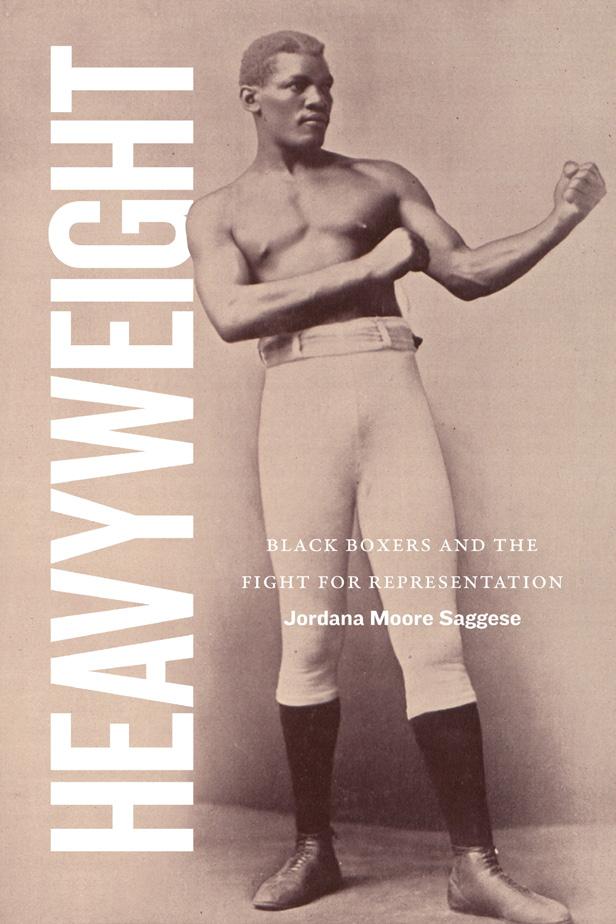
August 304 pages, 73 illustrations, including 8 in color paper, 978-1-4780-3063-8 $28.95/£24.99 cloth, 978-1-4780-2640-2 $107.95/£97.00
Contemporary art/Black
diaspora
17

October 136 pages, 21 color images paper, 978-1-4780-3078-2 $23.95tr/£20.99 cloth, 978-1-4780-2654-9 $89.95/£81.00
Six Paintings from Papunya
A Conversation
FRED R. MYERS and TERRY SMITH
With a reflection by STEPHEN GILCHRIST
In the early 1970s at Papunya, a remote settlement in the Central Australian desert, a group of Indigenous artists decided to communicate the sacred power of their traditional knowledge to the wider worlds beyond their own. Their exceptional, innovative efforts led to an outburst of creative energy across the continent that gave rise to the Contemporary Aboriginal Art movement that continues to this day. In their new book, anthropologist Fred Myers and art critic Terry Smith discuss six Papunya paintings featured in a 2022 exhibition in New York. They draw on several discourses that have developed around First Nations art—notably anthropology, art history, and curating as practiced by Indigenous and non-Indigenous interpreters. Their focus on six key paintings enables unusually close and intense insight into the works’ content and extraordinary innovation. Six Paintings from Papunya also includes an afterword by Indigenous curator and scholar Stephen Gilchrist, who reflects on the nature and significance of this rare transcultural conversation.
Fred Myers is Silver Professor of Anthropology at New York University and author of Painting Culture: The Making of an Aboriginal High Art, also published by Duke University Press. Terry Smith is Andrew W. Mellon Emeritus Professor of Contemporary Art History and Theory at the University of Pittsburgh and author of Art to Come: Histories of Contemporary Art, also published by Duke University Press.

August 328 pages, 9 illustrations paper, 978-1-4780-3048-5 $28.95/£24.99 cloth, 978-1-4780-2624-2 $107.95/£97.00
Cultural studies/Museum studies
The Politics of Collecting
Race and the Aestheticization of Property EUNSONG KIM
In The Politics of Collecting, Eunsong Kim traces how racial capitalism and colonialism situated the rise of US museum collections and conceptual art forms. Investigating historical legal and property claims, she argues that regimes of expropriation—rather than merit or good taste—are responsible for popular ideas of formal innovation and artistic genius. In doing so, she details how Marcel Duchamp’s canonization has more to do with his patron’s donations to museums than it does the quality of Duchamp’s work, and uncovers the racialized and financialized logic behind the Archive of New Poetry’s collecting practices. Ranging from the conception of philanthropy devised by the robber barons of the late nineteenth century to ongoing digitization projects, Kim provides a new history of contemporary art that accounts for the complicated entanglement of race, capital, and labor behind storied art institutions and artists. Drawing on history, theory, and economics, Kim challenges received notions of artistic success and talent and calls for a new vision of art beyond the cultural institution.
Eunsong Kim is Associate Professor of English at Northeastern University.
Aboriginal art
18
Artist, Audience, Accomplice
Ethics and Authorship in Art of the 1970s and 1980s
SYDNEY STUTTERHEIM
In Artist, Audience, Accomplice, Sydney Stutterheim introduces a new figure into the history of performance art and related practices of the 1970s and 1980s: the accomplice. Occupying roles including eyewitness, romantic partner, studio assistant, and documenter, this figure is situated between the conventional subject positions of the artist and the audience. The unseen and largely unacknowledged contributions of such accomplices exceed those performed by a typical audience because they share in the responsibility for producing artworks that entail potential ethical or legal transgressions. Stutterheim analyzes the art of Chris Burden, Hannah Wilke, Martin Kippenberger, and Lorraine O’Grady, showing how each cannily developed strategies of shared culpability that invoked questions about the accomplice’s various rights and roles. In this way, Stutterheim argues that the artist’s authority is not sovereign, total, or exclusive, but rather fluid and relational. By examining the development of an alternative model of participatory art that relies on a network of accomplices, Stutterheim radically revises current understandings of artistic agency, aesthetic property, and acknowledged authorship.
Sydney Stutterheim is an art historian based in Los Angeles and coeditor of Poetic Practical: The Unrealized Work of Chris Burden
Art/Globalization
Biennial Boom
Making Contemporary Art Global PALOMA CHECA-GISMERO
In Biennial Boom, Paloma Checa-Gismero traces an archeology of contemporary art biennials to uncover the processes that prompted these exhibitions to become the global art world’s defining events at the end of the twentieth century. Returning to the early post-Cold War years, Checa-Gismero examines the early iterations of three well-known biennials at the borders of North Atlantic liberalism: the Bienal de La Habana, inSITE, and Manifesta. She draws on archival and oral history fieldwork in Cuba, Mexico, the US/ Mexico borderlands, and the Netherlands, showing how these biennials reflected a postCold War optimism for a pacified world by which artistic and knowledge production would help mend social, political, and cultural divisions. Checa-Gismero argues that, in reflecting this optimism, biennials facilitated the conversion of subaltern aesthetic genealogies into forms that were legible to a nascent cosmopolitan global elite—all under the pretense of cultural exchange. By outlining how early biennials set the basis for what is now recognized as “global contemporary art,” Checa-Gismero intervenes in previous accounts of the contemporary art world in order to better understand how it became the exclusionary, rarified institution of today.
Paloma Checa-Gismero is Assistant Professor of Art History at Swarthmore College.
August 288 pages, 45 illustrations paper, 978-1-4780-3069-0 $27.95/£23.99 cloth, 978-1-4780-2643-3 $104.95/£94.00

August 328 pages, 48 illustrations, including 16 page color insert paper, 978-1-4780-3051-5 $28.95/£24.99 cloth, 978-1-4780-2628-0 $107.95/£97.00
Art history
19
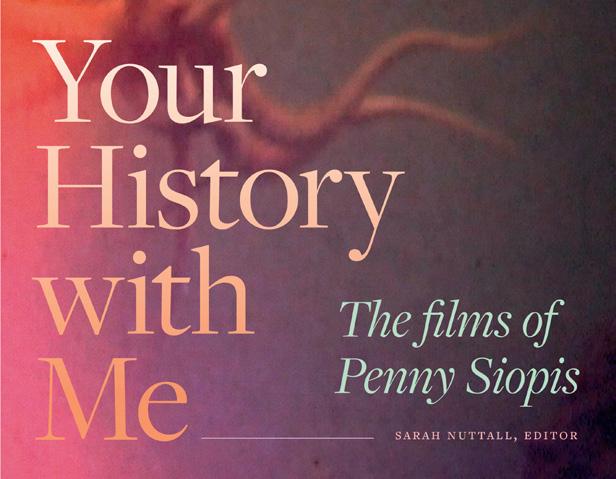
Your History with Me
The Films of Penny
Siopis
SARAH NUTTALL, editor
Penny Siopis is internationally acclaimed for her pathbreaking paintings and installations. Your History with Me is a comprehensive study of her short films, which have put her at the front ranks of contemporary artist-filmmakers. Siopis uses found footage to create short video essays that function as densely encrypted accounts of historical time and memory that touch on the cryptic and visceral elements of gender and power. The critics, scholars, curators, artists, and filmmakers in this volume examine her films in relation to subjects ranging from the history of Greeks in South Africa, trauma and cultural memory, and her relationship with the French New Wave to her feminist-inflected articulations of form and content and how her films comment on apartheid. They also highlight her global South perspective to articulate a mode of filmmaking highly responsive to histories of violence, displacement, and migration as well as pleasure, joy, and renewal. The essays, which are paired with vivid stills from Siopis’s films throughout, collectively widen the understanding of Siopis’s oeuvre. Opening new vocabularies of thought for engaging with her films, this volume outlines how her work remakes the possibilities of film as a mode of experimentation and intervention.
THEORY IN FORMS
A series edited by Nancy Rose Hunt, Achille Mbembe, and Todd Meyers
Sarah Nuttall is Professor of Literary and Cultural Studies at the University of the Witwatersrand, editor of Beautiful/Ugly: African and Diaspora Aesthetics and coeditor of Johannesburg: The Elusive Metropolis, both also published by Duke University Press, and author of Entanglement: Literary and Cultural Reflections on Postapartheid
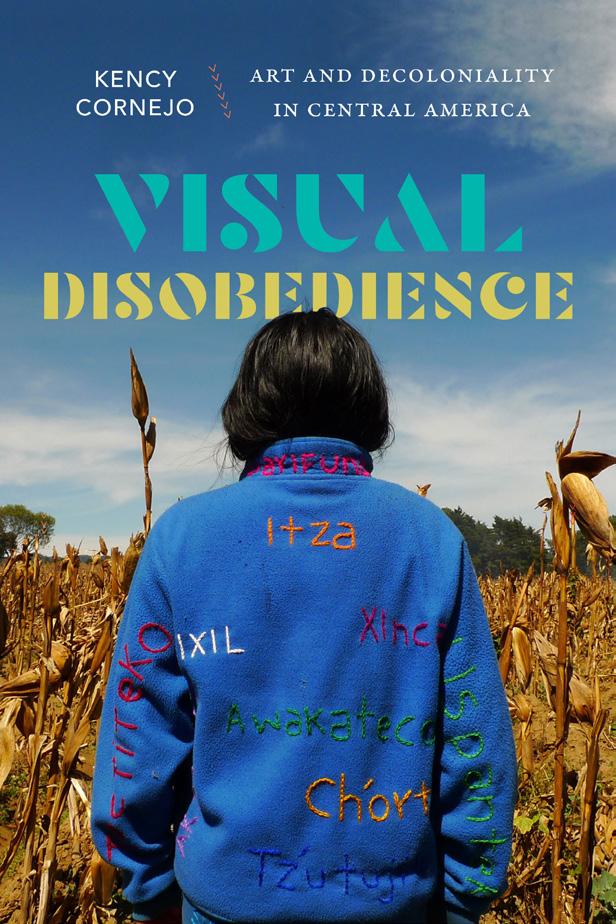
October 304 pages, 91 color illustrations paper, 978-1-4780-3054-6 $28.95/£24.99 cloth, 978-1-4780-2633-4 $107.95/£97.00
Contemporary art/Latin American studies
Visual Disobedience
Art and Decoloniality in Central America
KENCY CORNEJO
In Visual Disobedience, Kency Cornejo traces the emergence of new artistic strategies for Indigenous, feminist, and anticarceral resistance in the wake of torture, disappearance, killings, and US-funded civil wars in Central America. Cornejo reveals a direct line from US intervention to current forms of racial, economic, and gender injustice in the isthmus, connecting this to the criminalization and incarceration of migrants at the US-Mexico border today. Drawing on interviews with Central American artists and curators, she theorizes a form of “visual disobedience” in which art operates in opposition to nation-states, colonialism, and visual coloniality. She counters historical erasure by examining over eighty artworks and highlighting forty artists across the region. Cornejo also rejects the normalized image of the suffering Central American individual by repositioning artists as creative agents of their own realities. With this comprehensive exploration of contemporary Central American art, Cornejo highlights the role of visual disobedience as a strategy of decolonial aesthetics to expose and combat coloniality, heteropatriarchy, white supremacy, empire, and other systems of oppression.
DISSIDENT ACTS
A series edited by Macarena Gómez-Barris and Diana Taylor
Kency Cornejo is Associate Professor of Art History at the University of New Mexico.
Art/Film/Cultural theory
paper,
$65.00/£58.00
October 504 pages, 294 color illustrations
978-1-4780-3043-0
20
Art history/Indigenous studies/Museum studies
Eternal Sovereigns
Indigenous Artists, Activists, and Travelers Reframing Rome
GLORIA JANE BELL
In 1925, Pius XI staged the Vatican Missionary Exposition in Rome’s Vatican City. Offering a narrative of the Catholic Church’s beneficence to a global congregation, the Exposition displayed thousands of cultural belongings stolen from Indigenous communities across Turtle Island, which were seen by one million pilgrims. Gloria Bell’s Eternal Sovereigns offers critical revision to that story. Bell reveals the tenacity, mobility, and reception of Indigenous artists, travelers, and activists in 1920s Rome. Animating these conjunctures, the book foregrounds competing claims to sovereignty from Indigenous and papal perspectives. Bell deftly juxtaposes the Roman “Indian Museum” of nineteenth-century sculptor Ferdinand Pettrich with the oeuvre of Indigenous artist Edmonia Lewis. Bell analyzes Indigenous cultural belongings made by artists from diverse nations including Cree, Lakota, Anishinaabe, Nipissing, Kanien’kehá:ka, Wolastoqiyik, and Kwakwaka’wakw. Drawing on years of archival research and field interviews, Bell provides insight into the Catholic Church’s colonial collecting and its ongoing ethnological display practices. Written in a voice that questions the academy’s staid conventions, the book reclaims Indigenous belongings and other stolen treasures that remain imprisoned in the strongholds of the Vatican Museums.
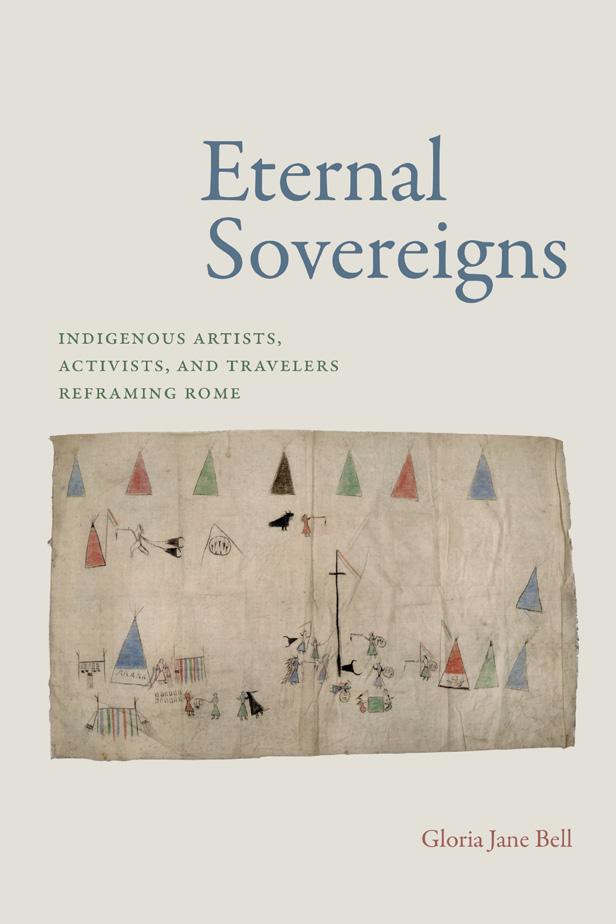
October 256 pages, 47 illustrations, including 16 in color paper, 978-1-4780-3088-1 $26.95/£22.99 cloth, 978-1-4780-2661-7 $102.95/£92.00
Art history/Indigenous studies/Environmental humanities
Earth Diplomacy
Indigenous American Art, Ecological Crisis, and the Cold War
JESSICA L. HORTON
In Earth Diplomacy, Jessica L. Horton reveals how Native American art in the mid-twentieth-century mobilized Indigenous cultures of diplomacy to place the earth itself at the center of international relations. She focuses on a group of artists including Pablita Velarde, Darryl Blackman, and Oscar Howe who participated in exhibitions and lectures abroad as part of the United States’s Cold War cultural propaganda. Horton emphasizes how their art modeled a radical alternative to dominant forms of statecraft, a practice she calls “earth diplomacy:” a response to extractive colonial capitalism grounded in Native ideas of deep reciprocal relationships between humans and other beings that govern the world. Horton draws on extensive archival research and oral histories as well as analyses of Indigenous creative work including paintings, textiles, tipis, adornment, and artistic demonstrations. By interweaving diplomacy, ecology, and art history, Horton advances Indigenous frameworks of reciprocity with all beings in the cosmos as a path to transforming our broken system of global politics.
Jessica L. Horton is an Associate Professor in the Department of Art History at the University of Delaware and author of Art for an Undivided Earth: The American Indian Movement Generation, also published by Duke University Press.

August 392 pages, 97 illustrations, including 16 page color insert paper, 978-1-4780-3049-2 $30.95/£26.99 cloth, 978-1-4780-2626-6 $114.95/£103.00
Gloria Jane Bell is Assistant Professor of Art History at McGill University.
21

December 270 pages, 6 illustrations 978-1-4780-2999-1 $15.00/£12.99
New Citizenship Studies
CARRIE HYDE and DERRICK R. SPIRES, editors
A special issue of American Literature
Topics covered include New Citizenship Studies, an emergent methodology for reading the role of literature in the cultural making and unmaking of citizenship; the violent histories and imaginative possibilities of citizenship; theories of citizenship from the perspectives of groups who cannot presume the state’s protections; citizenship at the intersection of Indigenous Studies, Black Studies, and multiethnic U.S. literatures; and the forms of worldmaking and community that writers build as practitioners of political poiesis.
Contributors Ajay Batra, Eve Eure, Carrie Hyde, Stephen Knadler, Florencia Lauria, Rodrigo Lazo, Joseph Miranda, Xiomara Santamarina, Sidonia Serafini, Derrick R. Spires, Erin Suzuki, Kathryn Walkiewicz, Edlie Wong, Sunny Xiang

June 247 pages, 11 illustrations paper, 978-1-4780-2993-9 $12.00/£9.99
Theory and philosophy/Women's studies/Black studies
Ordinariness
ANNABEL BARRY, editor
A special issue of Qui Parle
Topics covered include feminist applications of ordinary language philosophy; new interpretations of Ludwig Wittgenstein; the concept of the “ordinary” in Black studies; accounts of ordinary affects, such as failure, in affect theory; and non-philosophy and the critique of philosophy.
Contributors Nicholas Baer, Annabel Barry, Hannah Cox, Eesha Kumar, Sandra Laugier, Adrian De Leon, Daryl Maude, Sean Michael Muller, Ianna Hawkins Owen, Thomas Sutherland, Amber Sweat
Literary studies/American studies
22
Black feminism/Queer theory
“Inside the Black (W)hole”
A Queer Black Feminist Retrospective SHONIQUA ROACH, editor
A special issue of differences
Topics include what it means for queer black feminists to labor in a field under constant erasure; queer and trans black women’s erotic agency while seeking medical care in hostile institutions, including academic and medical industrial complexes; and the relevance of empirical black holes for theorizing polymorphous black female sexualities and erotic freedoms. The issue commemorates the publication of Evelynn Hammonds’s field-defining essay, “Black (W)holes and the Geometry of Black Female Sexuality” thirty years ago.
Contributors Moya Bailey, Kimberly Bain, V. Varun Chaudhry, Megan Finch, Julian Kevon Glover, Sharon Holland, Amber Jamilla Musser, Chanda Prescod-Weinstein, Shoniqua Roach, Petal Samuel, Tiffany Willoughby-Herard

September 235 pages, 3 illustrations 978-1-4780-2998-4 $15.00/£12.99
LGBTQ studies/Cultural studies
Queering the Domestic
LAUREN JAE GUTTERMAN, MARTIN F. MANALANSAN IV, and STEPHEN VIDER, editors
A special issue of GLQ
Topics covered include queering the domestic by examining the diverse functionings of “home” for past and present LGBTQ+ and other marginalized groups; housing precarity and homelessness; LGBTQ+ social movements; kinship and caretaking; LGBTQ+ representation in literature and film; and ethnographies of everyday life.
Contributors Rasel Ahmed, Miguel Avalos, Darius Bost, Zhen Cheng, Ariel Dela Cruz, René Esparza, Jules Gill-Peterson, Gayatri Gopinath, Lauren Jae Gutterman, Joseph Henry, Efadul Huq, Holly Jackson, Jina B. Kim, Martin F. Manalansan IV, Sara Matthiesen, Nivati Misra-Shenoy, Richard Mora, Shoniqua Roach, Cody St. Clair, Maggie Schreiner, Gee Imaan Semmalar, Virginia Thomas, Stephen Vider, Hentyle Yapp
Trans studies/Religious studies
The Inaugural Issue
MELISSA M. WILCOX and JOSEPH A. MARCHAL, editors
The inaugural issue of QTR: A Journal of Trans and Queer Studies in Religion
Topics covered include queer worldmaking among Orthodox Jewish gays and lesbians in Israel; the religious lives of Latina and Black trans activists Sylvia Rivera and Marsha P. Johnson; the importance of engaging trans and queer studies in religion during a time of anti-trans and anti-queer legislation; non-secular transfeminism in Turkey; and the role of Jewishness in John Boswell’s historiography.
Contributors Şahin Açıkgöz, Orit Avishai, Beshouy Botros, Ahmad Greene-Hayes, Janet R. Jakobsen, Joy Ladin, Joseph A. Marchal, Isaiah Frost Rivera, SA Smythe, Max Strassfeld, Melissa M. Wilcox

October 216 pages, 21 illustrations 978-1-4780-2997-7 $15.00/£12.99

May 153 pages, 10 illustrations 978-1-4780-2994-6 $14.00/£11.99
23

October 277 pages, 1 illustration
978-1-4780-2996-0 $20.00/£16.99
Transnational Feminist Vistas
GINETTA
E. B. CANDELARIO, editor
A special issue of Meridians
Topics covered include feminist perspectives about the realities of grappling with colonial legacies within global south communities in North America, Asia, and Africa; the impacts of colonial logic in shaping community identity and boundaries; complex entanglements with neo-colonialism while striving for decolonial praxis; and memory and trauma within communities disrupted by U.S. colonial interests.
Contributors Maryam Ala Amjadi, La Vaughn Belle, Umayyah Cable, Ginetta E. B. Candelario, Debjani Chakravarty, Chia-Hsu Jessica Chang, Sutapa Chattopadhyay, Henrikke Sæthre Ellingsen, Guadalupe Escobar, Levi Gahman, Caroline M. Mar, Nasha Mohamed, Chamara Moore, Aurora Santiago Ortiz, Shreya Parikh, Christine Standish, Aisha A. Upton, Lisa Wright, Ming Li Wu

November 198 pages, 4 illustrations 978-1-4780-2995-3 $14.00/£11.99
Asian studies/Globalization
Expansive Trajectories
Re-Mapping Transnationalism in the Global China Era
FRAN MARTIN, editor
A special issue of positions
Topics covered include the impacts of China’s economic and geopolitical global rise on cross-border media, financial, and human flows; everyday experiences of cultural globalization by ordinary Chinese people; and the ways in which transnationalization transforms representations, understandings, and practices of class, gender, race, nationality, and ethnicity in China.
Contributors Fanni Beck, Haijing Dai, Qian Gong, Christina Ho, Shuheng Jin, Anita Koo, Shih-Diing Liu, Fran Martin, Jacqueline Nelson, Pál Nyíri, Ngai Pun, Dallas Rogers, Lin Song, Huan Wu, Ting-Fai Yu

October 230 pages, 35 illustrations 978-1-4780-2992-2 $14.00/£11.99
Postcolonial studies/World history
Revolutionary Papers
Anticolonial Periodicals from the Global South
MAHVISH AHMAD, KONI BENSON, and HANA MORGENSTERN, editors
A special issue of Radical History Review
Topics covered include periodicals and other print ephemera—newspapers, literary journals, magazines, pamphlets, and handbills—as crucial sites of leftist, anti-imperial, and anti-colonial critical production; anti-imperialism, decolonization, and postcolonial studies; revolution, revolutionary politics, leftist politics, Marxism, socialism, communism, Maoism, and Islamic socialism; anti-authoritarianism, neocolonialism, and postcolonial states; people’s histories, subaltern studies, and histories from below.
Contributors Javaria Ahmad, Areej Akhtar, Amsale Alemu, Pablo Alvarez, Koni Benson, Drew Kahu ʻāina Broderick, Asher Gamedze, Thayer Hastings, Aaron Katzeman, Sara Kazmi, Sana Farrukh Khan, Promise Li, Sara Marzagora, Mae A. Miller-Likhethe, Nashilongweshipwe Mushaandja, Noor Nieftagodien, Francisco Rodriguez, Marral Shamshiri-Fard, Njoki Wamai, Kimani Waweru, Tony Wood, Rafeef Ziadeh
Feminism/Cultural studies/Activism
24
The Promise of Beauty
MIMI THI NGUYEN
In The Promise of Beauty, Mimi Thi Nguyen explores the relationship between the concept of beauty and narratives of crisis and catastrophe. Nguyen conceptualizes beauty, which she observes that we turn to in emergencies and times of destruction, as a tool to identify and bridge the discrepancy between the world as it is and what it ought to be. Drawing widely from aesthetic and critical theories, Nguyen outlines how beauty—or its lack—points to the conditions that must exist for it to flourish. She notes that an absence of beauty becomes both a political observation and a call to action to transform the conditions of the situation so as to replicate, preserve, or repair beauty. The promise of beauty can then engender a critique of social arrangements and political structures that would set the foundations for its possibility and presence. In this way, Nguyen highlights the role of beauty in inspiring action toward a more just world.
Mimi Thi Nguyen is Associate Professor of Gender and Women’s Studies at the University of Illinois, Urbana-Champaign, author of The Gift of Freedom: War, Debt, and Other Refugee Passages, and coeditor of Bangtan Remixed: A Critical BTS Reader, both also published by Duke University Press.
Gender and sexuality/Media studies/Critical legal theory
Indie Porn
Revolution, Regulation, and Resistance
ZAHRA STARDUST
In Indie Porn, Zahra Stardust examines the motivations and interventions of independent porn producers as they navigate criminal laws, risk-averse platforms, discriminatory algorithms, and rampant piracy. Herself a porn performer and participant, Stardust takes readers behind the scenes, offering intimate insights into this socio-political movement. She finds politicians who watch porn in parliament, protesters leading face-sitting demonstrations, sex workers making COVID-safe pornography, and artists reverse-engineering porn detection software. Against the backdrop of a global gig economy, Stardust documents the promises of indie porn to democratize content, revolutionize production, and redistribute wealth while outlining the fantasies of regulators, whose illusions of what porn is and does foreclose possibilities for transformation. Inevitably, as these paradigms collide, porn producers engage in creative tactics to hustle for survival and visibility, from ethical certification to law reform, sometimes reproducing hierarchies of stigma themselves. By highlighting how porn stigma is bound up with intersecting oppressions, Stardust identifies these junctions as coalitional opportunities for changing social relationships to sex, work, and capitalism.
A CAMERA OBSCURA BOOK
A series edited by Lynne Joyrich, Patricia White, Lalitha Gopalan, Bliss Cua Lim, Homay King, Tess Takahashi, Constance Penley, and Sharon Willis
Zahra Stardust is a Postdoctoral Research Fellow in the Digital Media Research Centre, Queensland University of Technology.
October 312 pages, 5 illustrations paper, 978-1-4780-3097-3 $28.95/£24.99 cloth, 978-1-4780-2676-1 $107.95/£97.00

October 328 pages, 39 illustrations paper, 978-1-4780-3106-2 $28.95/£24.99 cloth, 978-1-4780-2681-5 $107.95/£97.00
Feminist theory/Cultural studies
25
November 312 pages, 45 illustrations paper, 978-1-4780-3112-3 $28.95tr/£24.99 cloth, 978-1-4780-2688-4 $107.95/£97.00 Rights: United States
Y-Dang Troeung (1979–2022) was Associate Professor of English Languages and Literatures at the University of British Columbia and author of Refugee Lifeworlds: The Afterlife of the Cold War in Cambodia.
Landbridge Life in Fragments
Y-DANG TROEUNG
“Beautifully, elegiacally written.”—TORONTO STAR
“A compelling, multileveled story. At a time when a resurgent global fascism builds much of its support through racist and xenophobic attacks on refugees, this remarkable and beautiful book is a much-needed corrective.”— VANCOUVER SUN
“Landbridge is a deeply moving memoir of love and loss after wars that are not ended, especially for those whose lives are indelibly marked by its injuries. The impact of a life in fragments—fragmented by war, death, trauma, and finally, chemotherapy—is felt on every page as Y-Dang Troeung grapples with what it means to commit her memory of all these fragments to writing, for love of herself, others like her—Cambodian refugees—and her family, including her partner and son to whom she leaves this memoir.”—
MIMI THI NGUYEN
, author of The Promise of Beauty
“Landbridge is the most courageous act of love . . . a book that illuminates with laserbright insight the duty of the ‘survivor.’ Y-Dang [Troeung]’s wisdom, stoicism, and brilliance survive in this masterpiece to console and guide generations to come.”
ALICE PUNG
, author of One Hundred Days
In 1980, Y-Dang Troeung and her family were among the last of the 60,000 refugees from Cambodia that Canada agreed to admit. Their landing was widely documented in newspapers, with photographs of the Prime Minister shaking Troeung’s father’s hand and patting baby Y-Dang’s head. Troeung became a literal poster child for the benevolence of the Canadian refugee project. She returns to this moment forty years later in her arresting memoir Landbridge, where she explores the tension between that public narrative of happy “arrival,” and the multiple, often hidden truths of what happened to her family. In precise, beautiful prose, Troeung moves back and forth in time to tell stories about her parents and two brothers who lived through the Cambodian genocide, about the lives of her grandparents and extended family, about her own childhood in the refugee camps and in rural Ontario, and eventually about her young son’s illness and her own diagnosis with a terminal disease. Throughout this brilliant and astonishing book, Troeung looks with bracing clarity at refugee existence and dares to imagine a better future, with love.
Memoir/Asian American studies
26
American studies/Asian American studies
Settler Militarism
World War II in Hawai'i and the Making of US Empire JULIET NEBOLON
Under martial law during World War II, Hawaiʻi was located at the intersection of “home front” and “war front.” In Settler Militarism, Juliet Nebolon shows how settler colonialism and militarization simultaneously perpetuated, legitimated, and concealed one another in wartime Hawaiʻi for the purposes of empire building in Asia and the Pacific Islands. She demonstrates how settler militarism operated through a regime of racial liberal biopolitics that purported to protect all people in Hawaiʻi even as it intensified the racial and colonial differentiation of Kanaka Maoli, Asian settlers, and white settlers. Nebolon identifies settler militarism’s inherent contradiction: it depends on life, labor, and land to reproduce itself, yet it avariciously consumes those same lives and natural resources that it needs to subsist via violent and extractive projects. From vaccination and blood bank programs to the administration of internment and prisoner of war camps, Nebolon reveals how settler militarism and racial liberal biopolitics operated together in the service of capitalism. Collectively, the social reproduction of these regimes created the conditions for the late-twentieth-century expansion of US military empire.
Juliet Nebolon is Assistant Professor of American Studies at Trinity College.
Geography/Mobility studies
Evacuation
The Politics and Aesthetics of Movement in Emergency PETER ADEY
In Evacuation, Peter Adey examines the politics, aesthetics, and practice of moving people and animals from harm during emergencies. He outlines how the governance and design of evacuation is recursive, operating on myriad political, symbolic, and affective levels in ways that reflect and reinforce social hierarchies. Drawing on a wide range of case studies, from the retrieval of wounded soldiers from the battlefield during World War I and escaping the World Trade Center on 9/11 to the human and animal evacuations in response to the 2009 Australian bushfires and the 2010 Haiti earthquake, Adey demonstrates that evacuation is not an equal process. Some people may choose not to move while others are forced, some may even be brought into harm through evacuation. Often the poorest, racialized, and most marginalized communities hold the least power in such moments. At the same time, these communities can generate compassionate, creative, and democratic forms of care that offer alterative responses to crises. Ultimately, Adey contends, understanding the practice of evacuation illuminates its importance to power relations and everyday governance.
Peter Adey is Professor of Human Geography at Royal Holloway University of London; author of Mobility, Air: Nature and Culture, and Aerial Life: Spaces, Mobilities, Affects ; and coauthor of Moving Towards Transition: Commoning Mobilities for a Low-Carbon Future.
November 272 pages, 8 illustrations paper, 978-1-4780-3101-7 $27.95/£23.99 cloth, 978-1-4780-2677-8 $104.95/£94.00
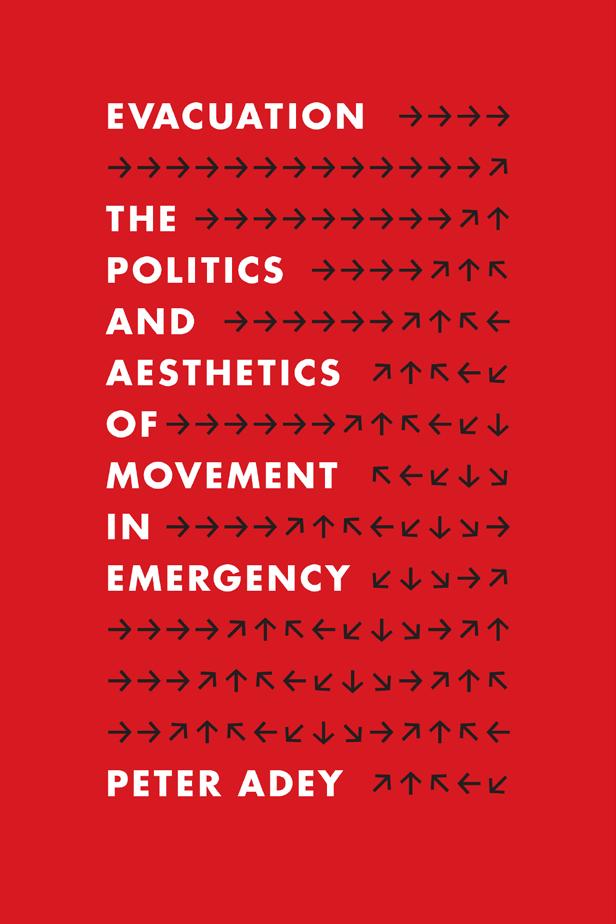
September 328 pages, 53 illustrations paper, 978-1-4780-3058-4 $28.95/£24.99 cloth, 978-1-4780-2639-6 $107.95/£97.00
27
September 304 pages
paper, 978-1-4780-3072-0 $28.95/£24.99
cloth, 978-1-4780-2648-8 $107.95/£97.00
Geography/Critical legal studies/International political economy
Judicial Territory
Law, Capital, and the Expansion of American Empire SHAINA POTTS
In Judicial Territory, Shaina Potts reveals how the American empire has benefitted from the post-World War II expansion of United States judicial authority over the economic decisions of postcolonial governments. Introducing the term “judicial territory” to refer to the increasingly transnational space over which US courts wield authority, Potts argues that law is an essential tool for US geopolitical and economic interests. Through close examination of cases involving private US companies, on the one hand, and foreign state-owned enterprises, nationalizations, and sovereign debt, on the other, she shows that technical changes relating to the treatment of foreign sovereigns in domestic US law allowed the United States to extend its purview over global financial and economic relations, including many economic decisions of foreign governments. Throughout, Potts argues, US law has not become divorced from territoriality but instead actively remapped it; and it has not merely responded to globalization, but actively produced it—making the whole world part of US economic space in the process.

September 216 pages, 29 illustrations paper, 978-1-4780-3060-7 $25.95/£21.99 cloth, 978-1-4780-2636-5 $99.95/£90.00
Latinx studies/Religious studies
Sanctuary Everywhere
The Fugitive Sacred in the Sonoran Desert BARBARA ANDREA SOSTAITA
In Sanctuary Everywhere, Barbara Andrea Sostaita reimagines practices of sanctuary along the U.S.-Mexico border in order to explore the possibilities for radical fugitivity in the face of militarized border enforcement. After the 2016 presidential election, churches, universities, cities, and even states began declaring themselves sanctuaries. Sostaita proposes that these calls for expanded sanctuary are insufficient when dealing with the everyday workings of immigration enforcement. Through fieldwork in migrant clinics, shelters, and the Sonoran Desert, Sostaita demonstrates that, as a sacred practice, sanctuary cannot be fixed in any one destination or mandate. She turns to those working to create sanctuary on the move, from a deported nurse offering medical care on the border to incarcerated migrant women denying rules on touch in detention facilities to collectives set up to honor those who died crossing the border. Understanding sanctuary to be a set of fugitive practices that escape the everyday, Sostaita shows us how, in the wake of extreme violence and loss, migrants create sanctuaries of their own to care for the living and the dead.
DUKE UNIVERSITY PRESS SCHOLARS OF COLOR FIRST BOOK AWARD
Barbara Andrea Sostaita is Assistant Professor of Latin American and Latino Studies at the University of Illinois Chicago.
Shaina Potts is Assistant Professor of Geography at the University of California, Los Angeles.
28
Life beside Bars
Confinement and Capital in an American Prison Town HEATH PEARSON
“heath pearson’s ethnographic voice is tightly attuned to the politics of living, as he deliberately rejects and excises styles and conventions of liberal humanism as a force in tight collusion with capitalism. This is a major accomplishment in and of itself, while his theorization of prisons is powerful. The wild array of stories from characters of all kinds in this carefully crafted book makes a significant point; I learned something of how people live. The effect of this book is visceral.”—
coauthor of The Hundreds
KATHLEEN STEWART,
In Life beside Bars, heath pearson showcases dynamic, interdependent community as the best hope for undoing the systems of confinement that reproduce capital in Cumberland County, New Jersey—a place that is home to three state prisons, one federal prison, and the regional jail. Pearson places today’s prisons within the region’s longer history of Lenape genocide, chattel slavery, Japanese American labor camps, and other forms of racialized punishment and carceral control. From this vantage, prisons appear not as the structural fix for the region’s failed political economy, but as a continuation of the carceral principle that has always sustained it. This ongoing use of confinement, though, is merely the backdrop. Through ethnographic vignettes written in story form, pearson offers an alternative history of the unruly and unexpected ways that people resist, get by, make money, find joy, and build radical social life in the small, unseen spaces beside large-scale confinement. As such, pearson enriches our understanding of daily life in and around prisons—in any American community—while providing a kaleidoscope of possibilities for theorizing and organizing alternative paths.
November 224 pages, 21 illustrations paper, 978-1-4780-3114-7 $26.95/£22.99 cloth, 978-1-4780-2692-1 $102.95/£92.00
heath pearson is Assistant Professor of Sociocultural Anthropology and Justice and Peace Studies at Georgetown University.
American studies/Anthropology/Prisons, police, and abolition
29
November 296 pages, 34 illustrations paper, 978-1-4780-3102-4 $27.95/£23.99 cloth, 978-1-4780-2674-7 $104.95/£94.00
Poor Things
How Those with Money Depict Those without It
LENNARD J. DAVIS
For generations most of the canonical works that detail the lives of poor people have been created by rich or middle-class writers like Charles Dickens, John Steinbeck, or James Agee. This has resulted in overwhelming depictions of poor people as living abject, violent lives in filthy and degrading conditions. In Poor Things, Lennard J. Davis labels this genre “poornography”—distorted narratives of poverty written by and for the middle and upper classes. Davis shows how poornography creates harmful and dangerous stereotypes that build barriers to social justice and change. To remedy this, Davis argues, poor people should write realistic depictions of themselves but because of representational inequality they cannot. Given the obstacles of the poor accessing the means of publication, Davis suggests that the work should, at least for now, be done by “transclass” writers who were once poor and who can accurately represent poverty without relying on stereotypes and clichés. Only then can the lived experience of poverty be more fully realized.
Lennard J. Davis is Distinguished Professor of Liberal Arts and Sciences at the University of Illinois Chicago and the author of many books, including Enabling Acts: The Hidden Story of How the Americans with Disabilities Act Gave the Largest US Minority Its Rights
Disability studies/U.S. history/American studies
Menace to the Future
September 248 pages, 6 illustrations paper, 978-1-4780-3075-1 $26.95/£22.99 cloth, 978-1-4780-2651-8 $102.95/£92.00
A Disability and Queer History of Carceral Eugenics JESS WHATCOTT
In Menace to the Future, Jess Whatcott traces the link between US disability institutions and early twentieth-century eugenicist ideology, demonstrating how the legacy of those ideas continues to shape incarceration and detention today. Whatcott focuses on California, examining records from state institutions and reform organizations, newspapers, and state hospital museum exhibits. They reveal state confinement, coercive treatment, care neglect, and forced sterilization were done out of the belief that the perceived unfitness of disabled, mad, and neurodivergent people was hereditary, and thus posed a biological threat—a so-called “menace to the future.” Whatcott uncovers a history of disabled resistance to these institutions that predates disability rights movements, builds a genealogy of resistance, and tells a history of eugenics from below. Theorizing how what they call “carceral eugenics” informed state treatment of disabled, mad, and neurodivergent people a century ago, Whatcott shows not only how that same logic still exists in secure treatment facilities, state prisons, and immigration detention centers, but also why it must continue to be resisted.
Jess Whatcott is Assistant Professor of Women’s, Gender, and Sexuality Studies at San Diego State University.
Literary and cultural studies
30
Environmental studies/Indigenous studies/American studies
Erosion
American Environments and the Anxiety of Disappearance
GINA CAISON
In Erosion, Gina Caison traces how American authors and photographers have grappled with soil erosion as a material reality that shapes narratives of identity, belonging, and environment. Examining canonical American texts and photography including The Grapes of Wrath, Octavia Butler’s Parable series, John Audubon’s Louisiana writings, and Dorothea Lange’s Migrant Mother, Caison shows how concerns over erosion reveal anxieties of disappearance that are based in the legacies of settler colonialism. Soil loss not only occupies a complex metaphorical place in the narrative of American identity; it becomes central to preserving the white settler-colonial state through Indigenous dispossession and erasure. At the same time, Caison examines how Indigenous texts and art, such as Lynn Riggs’s play Green Grow the Lilacs, Karenne Wood’s poetry, and the photography of Monique Verdin, challenge colonial narratives of the continent by outlining the material stakes of soil loss for their own communities. From California to Oklahoma to North Carolina’s Outer Banks, Caison ultimately demonstrates that concerns over erosion reverberate out into issues of climate change, land ownership, Indigenous sovereignty, race, and cultural and national identity.
Gina Caison is Kenneth M. England Associate Professor of Southern Literature at Georgia State University, author of Red States: Indigeneity, Settler Colonialism, and Southern Studies, and coeditor of Remediating Region: New Media and the U.S. South
Geography/Sound studies
A Resonant Ecology
MAX RITTS
In A Resonant Ecology, Max Ritts traces how sound’s integration into the environmental politics of Canada’s North Coast has paved the way for massive industrial expansion. While conservationists hope that the dissemination of whale songs and other nature sounds will showcase the beauty of local wildlife for people around the world, Ritts reveals how colonial capitalism can co-opt sonic efforts to protect the coast. He demonstrates how digital technologies allow industry to sonically map new shipping lanes and facilitate new ways of experiencing sound—premised not on listening, but on sound’s exploitable status as a data resource. By outlining how sound can both perpetuate and refuse capitalist colonialism, Ritts challenges the idea that the sonic realm is inherently liberatory and reveals sound to be a powerfully uncertain object. Through a situated geographical approach, he makes the case that only a decolonial and multigenerational environmental politics can counter the false promise of “sustainable marine development” held up by industry and the state.
SIGN, STORAGE, TRANSMISSION
A series edited by Jonathan Sterne and Lisa Gitelman
Max Ritts is Assistant Professor of Geography at Clark University.
November 280 pages, 12 illustrations paper, 978-1-4780-3116-1 $27.95/£23.99 cloth, 978-1-4780-2691-4 $104.95/£94.00
October 216 pages, 7 illustrations paper, 978-1-4780-3091-1 $25.95/£21.99 cloth, 978-1-4780-2664-8 $99.95/£90.00
31
October 208 pages, 8 illustrations paper, 978-1-4780-3086-7 $25.95/£21.99 cloth, 978-1-4780-2662-4 $99.95/£90.00

Annemarie Mol is Professor of Anthropology of the Body at the University of Amsterdam and author of Eating in Theory and The Body Multiple: Ontology in Medical Practice, both also published by Duke University Press.
Eating Is an English Word
ANNEMARIE MOL
“To eat. Comer. Lekker. Tasty. Schmecka. Gustar. Don’t reach for your dictionary to find equivalencies. Instead, read and digest this engaging book to appreciate how different wording points to different worlding around food and eating! Annemarie Mol and her multilingual collaborators challenge us all to confront the analytical limits of English’s hegemony as ‘our’ academic language.”— HEATHER PAXSON, editor of Eating beside Ourselves: Thresholds of Foods and Bodies
Eating is generally understood as a human need that people satisfy in diverse ways. Eating, however, is also an English word. Other languages, using other words, order reality differently: they may fuse eating with breathing, or distinguish chupar from comer. Anthropologists flag up such differences by leaving a few of their words untranslated, but what language do we think in? This isn’t necessarily English. We may be linguistically closer to those whose practices we study: them. Against this background, Eating Is an English Word argues that social scientists should let go of the dream of universal concepts. Our analytical terms had better vary. Annemarie Mol and her coauthors exemplify this in a series of material semiotic inquiries into eating practices. They employ terms like lekker, tasting with fingers, chupar, schmecka, gustar, and settling on an okay meal to explore appreciative modes of valuing. Welcome, then, to spirited stories about satisfied stomachs, love for a lamb, juicy fruit treats, and companionable lunches and dinners.
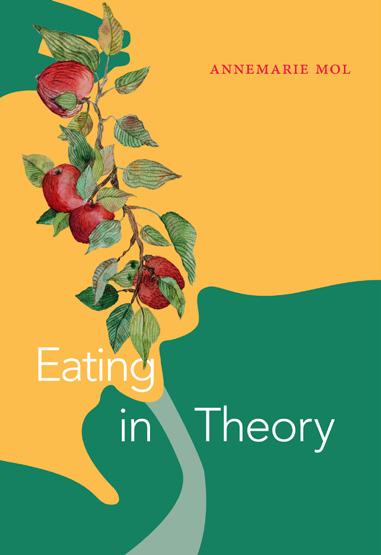
Eating in Theory paper, $25.95/£21.99 978-1-4780-1141-5 / 2021
Anthropology/Science studies/Food studies
Also by Annemarie Mol
32
The Inner Life of Race
Souls, Bodies, and the History of Racial Power
LEEROM MEDOVOI
In The Inner Life of Race, Leerom Medovoi turns away from conventional views of race as a politics of the phenotypical body to theorize race instead as a politics of populational threat. Racism’s genealogy, argues Medovoi, invokes longstanding theological distinctions between the body and the soul. While the body can be seen and marked, the soul signals potentially threatening interiorities: dangerous intentions, beliefs, or desires. Race is the power-effect of reading the body in order to police the political threat of the soul. Medovoi’s genealogy begins with medieval deployments of inquisition and confession to wage war against heretics, infidels, and their threat to the salvation of souls. In early modern Spain, these pastoral technologies of power catalyzed the invention of race as a language for the danger of formerly Jewish and Muslim converts. Medovoi shows how this discourse expanded into anti-blackness and anti-indigeneity throughout the colonial world and modern Europe, laying the foundation for racialized capitalism and liberal governmentality. Medovoi weaves histories of color-line racism, nativism, Islamophobia, antisemitism, and anticommunism into a pathbreaking account of the political work populational racism accomplishes.

Leerom Medovoi is Professor of English and Social, Cultural and Critical Theory at the University of Arizona, the author of Rebels: Youth and the Cold War Origins of Identity, and the coeditor of Religion, Secularism, and Political Belonging, both also published by Duke University Press. September 296 pages, 11 illustrations paper, 978-1-4780-3080-5 $27.95/£23.99 cloth, 978-1-4780-2656-3 $104.95/£94.00
Colonial and postcolonial studies/Black Atlantic
The Suicide Archive
Reading Resistance in the Wake of French Empire DOYLE D. CALHOUN
Throughout the French empire, from the Atlantic and the Caribbean to West and North Africa, men, women, and children responded to enslavement, colonization, and oppression through acts of suicide. In The Suicide Archive, Doyle D. Calhoun charts a long history of suicidal resistance to French colonialism and neocolonialism, from the time of slavery to the Algerian War for Independence to the “Arab Spring.” Noting that suicide was either obscured in or occluded from French colonial archives, Calhoun turns to literature and film to show how aesthetic forms and narrative accounts can keep alive the silenced histories of suicide as a political language. Drawing on scientific texts, police files, and legal proceedings alongside contemporary African and Afro-Caribbean novels, film, and Senegalese oral history, Calhoun outlines how such aesthetic works rewrite histories of resistance and loss. In so doing, Calhoun offers a new way of writing about suicide, slavery, and coloniality in relation to literary history.
Doyle D. Calhoun is Assistant Professor of Francophone Studies at Trinity College.

October 344 pages, 33 illustrations paper, 978-1-4780-3074-4 $28.95/£24.99 cloth, 978-1-4780-2650-1 $107.95/£97.00
Critical theory/Religion/Cultural studies
33
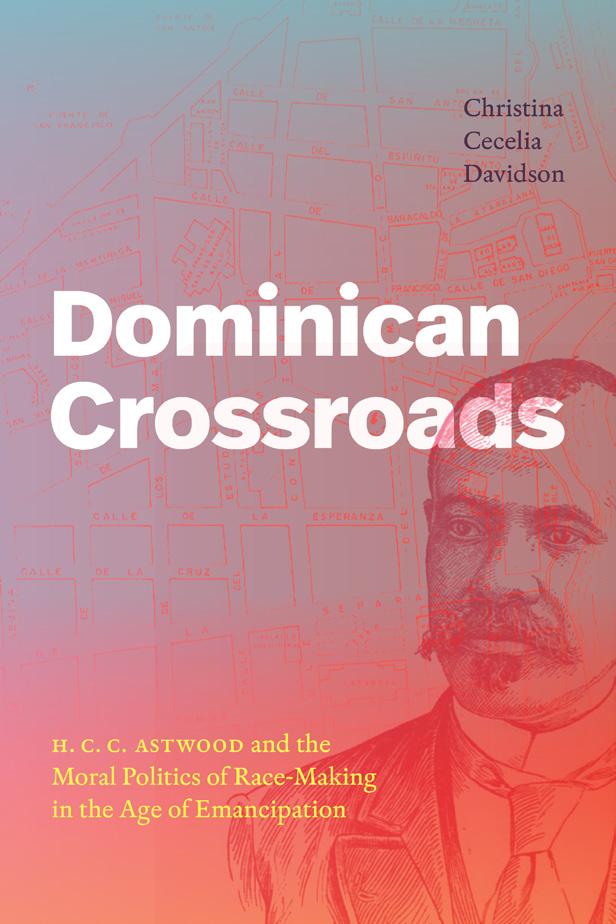
October 384 pages, 23 illustrations paper, 978-1-4780-3094-2 $30.95/£26.99 cloth, 978-1-4780-2669-3 $114.95/£103.00
Dominican Crossroads
H. C. C. Astwood and the Moral Politics of Race-Making in the Age of Emancipation
CHRISTINA CECELIA DAVIDSON
H. C. C. Astwood: minister and missionary, diplomat and politician, enigma in the annals of US history. In Dominican Crossroads, Christina Cecelia Davidson explores Astwood’s extraordinary and complicated life and career. Born in 1844 in the British Caribbean, Astwood later moved to Reconstruction era New Orleans, where he became a Republican activist and preacher in the African Methodist Episcopal (AME) Church. In 1882 he became the first Black man named US consul to the Dominican Republic. Davidson tracks the challenges that Astwood faced as a Black politician in an era of rampant racism and ongoing cross-border debates over Black men’s capacity for citizenship. As a US representative and AME missionary, Astwood epitomized Black masculine respectability. But as Davidson shows, Astwood became a duplicitous, scheming figure who used deception and engaged in racist moral politics to command authority. His methods, Davidson demonstrates, show a bleaker side of Black international politics and illustrate the varied contours of transnational moral discourse as people of all colors vied for power during the ongoing debate over Black rights in Santo Domingo and beyond.
Christina Cecilia Davidson is Assistant Professor of History at the University of Southern California.
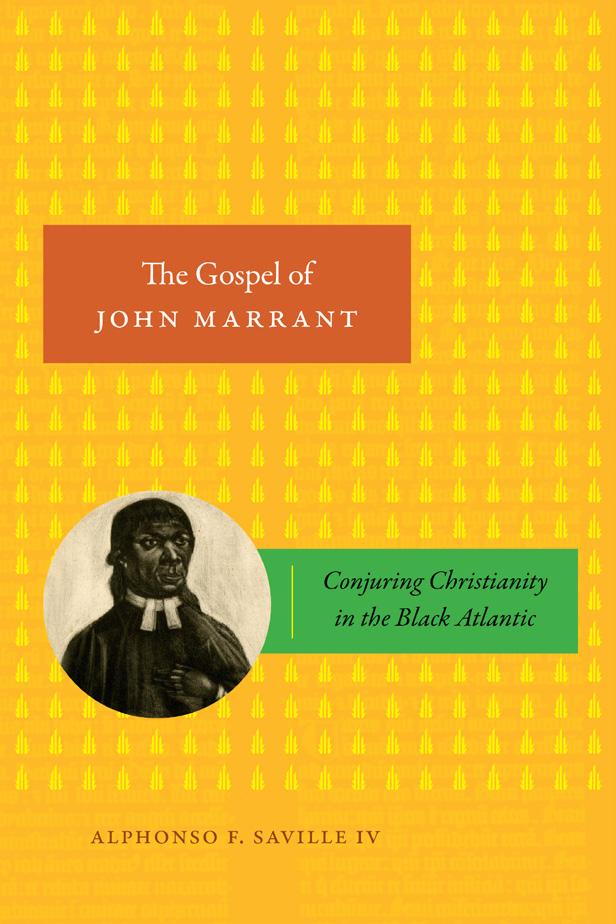
August 208 pages paper, 978-1-4780-3044-7 $25.95/£21.99 cloth, 978-1-4780-2621-1 $99.95/£90.00
African American studies/Religion/U.S. history
The Gospel of John Marrant
Conjuring Christianity in the Black Atlantic
ALPHONSO F. SAVILLE IV
Reverend John Marrant (1755–91) was North America’s first Black ordained minister and one of America’s earliest Black authors and preachers. In The Gospel of John Marrant, Alphonso F. Saville IV examines how Protestantism and West African indigenous religious practices deeply informed his life and ministry. Saville follows Marrant from his time evangelizing the Cherokee in Georgia to meeting with Black Freemasons in Boston to engaging with diasporic communities along the eastern seaboard and in England. Using the Black folk magic tradition of conjure as a lens for understanding Marrant’s religious imagination, Saville outlines the importance of Africana religious and cultural themes, symbols, and cosmologies in the biblical interpretation and ritual culture in early Black North American Christian communities. Marrant’s life and work, Saville contends, reveal the diverse religious cultures that contributed to the formation of African American Christianity and its evolution into a prominent institution during the colonial and early history of the United States. In so doing, he demonstrates the need to recenter both religion and Africa in the study of African American cultural and intellectual history.
RELIGIOUS CULTURES OF AFRICAN AND AFRICAN DIASPORA PEOPLE
A series edited by Jacob K. Olupona, Dianne M. Stewart, and Terrence L. Johnson
Alphonso F. Saville IV is Associate Research Scholar at the Center for Culture, Society, and Religion at Princeton University.
African diaspora/Caribbean history/Religion
34
The Second Battle for Africa
Garveyism, the US Heartland, and Global Black Freedom
ERIK S. MCDUFFIE
“Unlike previous works that examine Garveyism up to his deportation, Erik S. McDuffie carries the story forward into the twentieth century. More than this, he expertly and adroitly examines the many formations influenced by Garvey. He then sites these trends in the ‘Diasporic Midwest,’ working to establish this region as a hotbed of Garvey’s legacy. The Second Battle for Africa is a superior work of scholarship.”
GERALD HORNE , Moores Professor of History and African American Studies, University of Houston
In The Second Battle for Africa, Erik S. McDuffie establishes the importance of the US Midwest to twentieth-century global Black history, internationalism, and radicalism. McDuffie shows how cities like Chicago, Detroit, and Cleveland, as well as rural areas in the heartland, became central and enduring incubators of Marcus Garvey’s Black nationalist Universal Negro Improvement Association (UNIA) and its offshoots. Throughout the region, Black thinkers, activists, and cultural workers, like the Grenada-born activist Louise Little, championed Black freedom. McDuffie explores Garveyism and its changing facets from the 1920s onwards, including the role of Black Midwesterners during the emergence of fascism in the 1930s, the postwar US Black Freedom Movement and African decolonization, the rise of the Nation of Islam and Malcolm X in the 1950s and 1960s, and the continuing legacy of Garvey in today’s Black Midwest. Throughout, McDuffie evaluates the possibilities, limitations, and gendered contours of Black nationalism, radicalism, and internationalism in the UNIA and Garvey-inspired movements. In so doing, he unveils new histories of Black liberation and Global Africa.
December 440 pages, 48 illustrations paper, 978-1-4780-3104-8 $31.95/£27.99 cloth, 978-1-4780-2683-9 $117.45/£106.00

Erik S. McDuffie is Associate Professor of African American Studies and History at the University of Illinois Urbana-Champaign and author of Sojourning for Freedom: Black Women, American Communism, and the Making of Black Left Feminism
U.S. history/African American studies
35
November 384 pages, 4 illustrations paper, 978-1-4780-1918-3 $30.95/£26.99 cloth, 978-1-4780-1654-0 $114.95/£103.00
Black studies/Indigenous studies/Caribbean studies
Beyond Constraint
Middle/Passages of Blackness and Indigeneity in the Radical Tradition
SHONA N. JACKSON
In Beyond Constraint, Shona N. Jackson offers a new approach to labor and its analysis by demonstrating the fundamental relation between black and Indigenous People’s sovereign, free, and coerced labor in the Americas. Through the writings of Cedric Robinson, Walter Rodney, C. L. R. James, and Sylvia Wynter, Jackson confronts the elision of Indigenous People’s labor in the black radical tradition. She argues that this elision is an effect of the structural relation of antiblackness to anti-indigeneity through which native and black bodies are arranged on either side of a split between unproductive labor and productive work necessary for capital accumulation and for how we read capital in political economic critique. This division between labor and work forces the radical tradition to sustain the break between black and Indigenous peoples as part of its critical strategies of liberation. To address this impasse, Jackson reads the tradition against the grain for openings to indigeneity and a method for recovering lost labors.
Shona N. Jackson is an independent scholar and author of Creole Indigeneity: Between Myth and Nation in the Caribbean.
Anthropology/Caribbean studies/Geography
The Rule of Dons
Criminal Leaders and Political Authority in Urban Jamaica
November 232 pages, 15 illustrations paper, 978-1-4780-3115-4 $26.95/£22.99 cloth, 978-1-4780-2690-7 $102.95/£92.00
RIVKE JAFFE
Throughout Kingston, Jamaica, figures known as “dons” exercise political authority and are seen as legitimate leaders, despite their associations with crime and violence. In the absence of strong government support, they provide impoverished residents with access to security, conflict resolution, and various forms of welfare through their own resources and connections to Jamaica’s political parties. In The Rule of Dons, Rivke Jaffe shows how dons’ power relies on a widespread belief in their right to rule, explaining how criminal power is legitimized through a set of aesthetic, affective, and spatial mechanisms. She argues that dons must credibly embody an outlaw persona that stands outside of the political establishment, while also connecting strategically to state institutions and mobilizing democratic ideals such as freedom and equality. As such, dons represent a form of authority that involves balancing an autocratic form of rule with an established democratic order. While donmanship represents a historically and culturally specific type of political authority, Jaffe’s analysis of this phenomenon offers insights into the entanglement of violent autocratic rule and democratic institutions far beyond Jamaica.
Rivke Jaffe is Professor of Urban Geography at the University of Amsterdam and author of Concrete Jungles: Urban Pollution and the Politics of Difference in the Caribbean.
36
Critical ethnic studies/American studies/Feminist studies
All of Us or None
Migrant Organizing in an Era of Deportation and Dispossession
MONISHA DAS GUPTA
In All of Us or None, Monisha Das Gupta tells the story of contemporary anti-deportation organizing in the United States by migrants and refugees labeled as criminal aliens. These activists, who live daily with criminalization, work against forms of deportation that Das Gupta calls settler carcerality—the United States’ use of deportation to exert territorial control in the face of Indigenous self-determination. Drawing on fieldwork with antideportation organizing groups in New York, Los Angeles, Long Beach, and Honolulu, Das Gupta documents the inventive methods of struggle against settler carcerality. Das Gupta shows how the organizers’ actions and visions depart from the settler colonial nature of the mainstream demands for a pathway to citizenship and civil rights. Through direct action, storytelling, political education, and youth and queer leadership, these organizations and collectives conceptualize an abolitionist vision of migration justice that rejects the settler state and encompasses all those who are disavowed. By highlighting this work, Das Gupta demonstrates the transformative promise offered by a dissident migrant-led politics working toward dismantling settler structures and logics.
Monisha Das Gupta is a Professor in the Departments of Ethnic Studies and Women, Gender, and Sexuality Studies at the University of Hawaiʻi at Mānoa. She is the author of Unruly Immigrants: Rights, Activism, and Transnational South Asian Politics in the United States, also published by Duke University Press.
Third World studies/Ethnic studies
Third World Studies
Theorizing Liberation
GARY Y. OKIHIRO
Second Edition, Revised and Expanded
In this revised and expanded second edition of Third World Studies, Gary Y. Okihiro considers the methods and theories that might constitute the formation of Third World studies. Proposed in 1968 at San Francisco State College by the Third World Liberation Front but replaced by faculty and administrators with ethnic studies, Third World studies was over before it began. As opposed to ethnic studies, which Okihiro critiques for its liberalism and US-centrism, Third World studies begins with the colonized world and the anti-imperial, anticolonial, and antiracist projects located therein as was described by W. E. B. Du Bois in 1900. Third World studies analyzes the locations and articulations of power around the axes of race, gender, sexuality, (dis)ability, class, and nation. In this new edition, Okihiro emphasizes the work of Third World intellectuals such as M. N. Roy, José Carlos Mariátegui, and Oliver Cromwell Cox, foregrounds the importance of Bandung and the Tricontinental, and adds discussions of eugenics, feminist epistemologies, and religion. With this work, Okihiro establishes Third World studies as a theoretical formation and a liberatory practice.
Gary Y. Okihiro is Visiting Professor of American Studies and Ethnicity, Race, and Migration at Yale University. He is the author of many books, including The Boundless Sea: Self and History and American History Unbound: Asians and Pacific Islanders.
October 280 pages, 18 illustrations paper, 978-1-4780-3087-4 $27.95/£23.99 cloth, 978-1-4780-2665-5 $104.95/£94.00

August 328 pages, 4 illustrations paper, 978-1-4780-3067-6 $28.95/£24.99 cloth, 978-1-4780-2644-0 $107.95/£97.00
37

November 400 pages paper, 978-1-4780-3113-0 $30.95/£26.99 cloth, 978-1-4780-2689-1 $114.95/£103.00
Rio as Method
Collective Resistance for a New Generation PAUL AMAR, editor
Rio as Method provides a new set of lenses for apprehending and transforming the world at critical junctures. Challenging trends that position global South scholars as research informants or objects, this Rio de Janeiro-based network of scholars, activists, attorneys, and political leaders center their Brazilian megacity as a globally relevant source for transformational worldmaking insights. Presenting this volume as a handbook and manifesto for energizing public engagement and direct action, more than forty contributors reconceive method as a politics of knowledge production that animates new ways of being, seeing, and doing politics. They draw on lessons from the city’s intersecting religious, feminist, queer, Black, Indigenous, and urbanist movements to examine issues ranging from state violence, urban marginalization, and moral panic to anticorruption efforts, paramilitary policing, sex work, and mutual aid. Rethinking theoretical and collaborative research methods, Rio as Method models theories of decolonial analysis and concepts of collective resistance that can be taken up by scholar-activists anywhere.
DISSIDENT ACTS
A series edited by Macarena Gómez-Barris and Diana Taylor
Paul Amar is Professor of Global Studies at the University of California, Santa Barbara, and author of The Security Archipelago: Human-Security States, Sexuality Politics, and the End of Neoliberalism, also published by Duke University Press.
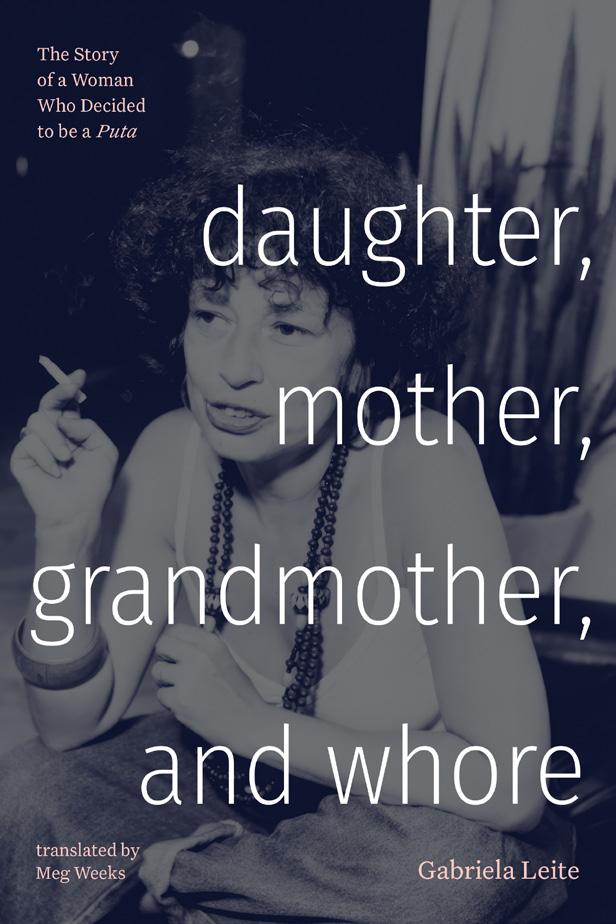
September 208 pages, 20 illustrations paper, 978-1-4780-3050-8 $25.95/£21.99 cloth, 978-1-4780-2627-3 $99.95/£90.00
Memoir/Sexuality/Latin America
Daughter, Mother, Grandmother, and Whore
The Story of a Woman Who Decided to be a Puta GABRIELA LEITE
Translated by MEG WEEKS
In the early 1970s, while living at home with her conservative, middle-class family and studying at the University of São Paulo, Gabriela Leite decided to become a sex worker. From her first client in a tiny room in downtown São Paulo to the launch of an exuberant clothing line designed for sex workers in Rio de Janeiro thirty years later, Daughter, Mother, Grandmother, and Whore tells the fascinating story of Leite’s bold and unique life in her own words. After helping organize Brazil’s first protests of sex workers against police brutality, she moved to Rio de Janeiro where she quickly became ensconced in the city’s storied red-light district. From there, Leite built a national network of politicized sex workers, worked for HIV/AIDS prevention efforts, and participated in Brazil’s robust new civil society after it returned to democracy in 1985 after a twenty-one-year military dictatorship. Insistent on advocating for the sex worker’s comprehensive human rights, Leite pioneered an irreverent grassroots Latin American feminism, which critiqued moral hypocrisies and Christian conservatism while affirming pleasure, joy, and agency. Daughter, Mother, Grandmother, and Whore also includes a foreword by artist and activist Carol Leigh.
LATIN AMERICA IN TRANSLATION/EN TRADUCCIÓN/EM TRADUÇÃO
Gabriela Leite (1951–2013) was a sex worker, activist, and organizer, and the founder of Brazil’s sexworker movement. Meg Weeks is Assistant Professor at the Center for Latin American Studies at the University of Florida.
Latin American studies/Brazil/Global South studies
38
The Buenos Aires Reader
History, Culture, Politics
DIEGO ARMUS and LISA UBELAKER ANDRADE, editors
“This is a brilliant introduction to one of the world’s most fascinating cities. Combining erudition and accessibility, it captures Buenos Aires in all its dizzying diversity. Through expertly chosen images and texts introduced with insightful explanations, the book will provide students, scholars, and travelers alike with a rich appreciation for the city’s history, architecture, subcultures, nightlife, politics, cuisine, sports, and more. Even repeat visitors will find thrilling new discoveries in these pages.”
MATTHEW B. KARUSH, George Mason University
“There are two versions of Buenos Aires: the one that is oversimplified and stereotyped, and the real, intricate, incredibly diverse city that I grew up in. This book is for those who want to get to know the latter, the true Buenos Aires, what makes it so stunning, infuriating, and enigmatic. More than an encyclopedia, it’s an ode to porteños, the people of Buenos Aires.”— JASMINE GARSD, National Public Radio correspondent and host of the podcast "The Last Cup/La Última Copa"
The Buenos Aires Reader offers an insider’s look at the diverse lived experiences of the people, politics, and culture of Argentina’s capital city primarily from the nineteenth century to the present. Refuting the tired cliché that Buenos Aires is the “Paris of South America,” this book gives a nuanced view of a city that has long been attentive to international trends yet never ceases to celebrate its local culture. The vibrant opinions, reflections, and voices of Buenos Aires come to life through selections that range from songs, poems, letters, and essays to interviews, cartoons, paintings, and historical documents, many of which have been translated into English for the first time. These selections tell the story of the city’s culture of protest and celebration, its passion for soccer and sport, its gastronomy and food traditions, its legendary nightlife, and its musical, literary, and artistic cultures. Providing an unparalleled look at Buenos Aires’ history, culture, and politics, this volume is an ideal companion for anyone interested in this dynamic, disruptive, and inventive city.
THE LATIN AMERICA READERS
A series edited by Robin Kirk and Orin Starn
November 408 pages, 69 illustrations, including 10 in color paper, 978-1-4780-3084-3 $33.95tr/£28.99 cloth, 978-1-4780-2660-0 $124.95/£112.00
Diego Armus is Professor of History at Swarthmore College and author of The Ailing City: Health, Tuberculosis, and Culture in Buenos Aires, 1870–1950, also published by Duke University Press. Lisa Ubelaker Andrade is Researcher and Professor at Universidad de San Andrés and a Lecturer at New York University-Buenos Aires.
Travel/Latin American studies
39
November 288 pages, 21 illustrations paper, 978-1-4780-3108-6 $27.95/£23.99 cloth, 978-1-4780-2685-3 $104.95/£94.00
Anthropology/Environment/Latin American studies
Forest Lost
Producing Green Capitalism in the Brazilian Amazon
MARON E. GREENLEAF
Forest Lost is an ethnography of forest carbon offsets and the wider effort to make the living rainforest valuable in the Brazilian Amazon. Unlike other forest commodities, forest carbon offsets do not involve resource extraction; instead, they require keeping carbon in place through forest protection. Maron Greenleaf explores forest carbon offsets to understand green capitalism—the use of capitalist logics and practices to mitigate environmental damage. She traces cultural, environmental, governmental, material, and multispecies relations involved in making forest carbon valuable and how forest carbon’s commodification in the Amazon turned it into a source of redistributable public environmental wealth. At the same time, Greenleaf shows how making forest carbon monetarily valuable created an unexpected set of uneven, contingent, and contested social and political relations. While forest carbon in the Amazon demonstrates that green capitalism can be socially inclusive, it also shows that green capitalism can reinforce the marginalization it purportedly seeks to combat. By outlining these complex relations and tensions, Greenleaf elucidates broader efforts to create a capitalism suited to the Anthropocene and those efforts’ alluring promises and vexing failures.
Maron E. Greenleaf is Assistant Professor of Anthropology at Dartmouth College.

August 328 pages paper, 978-1-4780-3059-1 $28.95/£24.99 cloth, 978-1-4780-2635-8 $107.95/£97.00
Gender studies/Political theory/Settler colonial studies
Unsettled Labors
Migrant Care Work in Palestine/Israel RACHEL
H. BROWN
In Unsettled Labors, Rachel H. Brown explores the overlooked labor of migrant workers in Israel’s eldercare industry. Brown argues that live-in eldercare in Palestine/Israel, which is primarily done by migrant workers, is an often invisible area where settler colonialism is reproduced culturally, economically, and biologically. Situating Israeli labor markets within a longer history of imperialism and dispossession of Palestinian land, Brown positions migrant eldercare within the resulting tangle of Israeli laws, policies, and social discourses. She draws from interviews with caretakers, public statements, court documents, and first-hand fieldwork to uncover the inherently contradictory nature of eldercare work: the intimate presence of South and Southeast Asian workers in the home unsettles the idea of the Israeli home as an exclusively Jewish space. By paying close attention to the comparative racialization of migrant workers, Palestinians, asylum seekers, and Mizrahi and Ashkenazi settlers, Brown raises important questions of labor, social reproduction, displacement, and citizenship told through the stories of collective care provided by migrant workers in a settler colonial state.
Rachel H. Brown is Assistant Professor of Women, Gender, and Sexuality Studies at Washington University in St. Louis.
40
After Palmares
Diaspora, Inheritance, and the Afterlives of Zumbi
MARC A. HERTZMAN
“After Palmares is a beautifully written and stunning work of historical scholarship. With its publication, Marc A. Hertzman will widely be recognized as one of the most important and original scholars working on Brazil and the African diaspora.”
BARBARA WEINSTEIN, author of The Color of Modernity: São Paulo and the Making of Race and Nation in Brazil
“In a genius move, Marc A. Hertzman takes the notion of a maroon settlement and asks what changes when we think about such places as starting points rather than endpoints in histories of the enslaved. This conceptualization of the significance of marronage reshapes the field by demanding that we understand fugitivity to both exist in the afterlives of violent histories but also serve as generative of powerful forms of well-being and community.”—
KATHRYN M. DE LUNA
, Provost’s Distinguished Associate Professor, Georgetown University
“After Palmares is a beautifully crafted and breathtaking history of the long afterlives of the legendary runaway slave community. With the rhythm of an analytical epic, Marc A. Hertzman reckons with what he brilliantly calls the inheritances and trajectories of the post-Palmares world that came to be after its defeat in 1695. This tremendous book is interdisciplinary work at its finest.”—YESENIA BARRAGAN, author of Freedom’s Captives: Slavery and Gradual Emancipation on the Colombian Black Pacific
In After Palmares, Marc A. Hertzman tells the rise, fall, and afterlives of Palmares, one of history’s largest and longest-lasting maroon societies. Forged during the seventeenth century by formerly enslaved Africans in what would become northeast Brazil, Palmares stood for a century, withstanding sustained attacks from two European powers. In 1695, colonial forces assassinated its most famous leader, Zumbi. Hertzman examines the remarkable ways that Palmares and its inhabitants lived on after Zumbi’s death, creating vivid portraits of those whose lives and voices scholars have often assumed are inaccessible. With an innovative approach to African languages, and paying close attention to place as well as African and diasporic spiritual beliefs, Hertzman reshapes our understanding of Palmares and Zumbi and advances a new framework for studying fugitive slave communities and marronage in the African diaspora.
RADICAL PERSPECTIVES
A series edited by Daniel J. Walkowitz and Barbara Weinstein
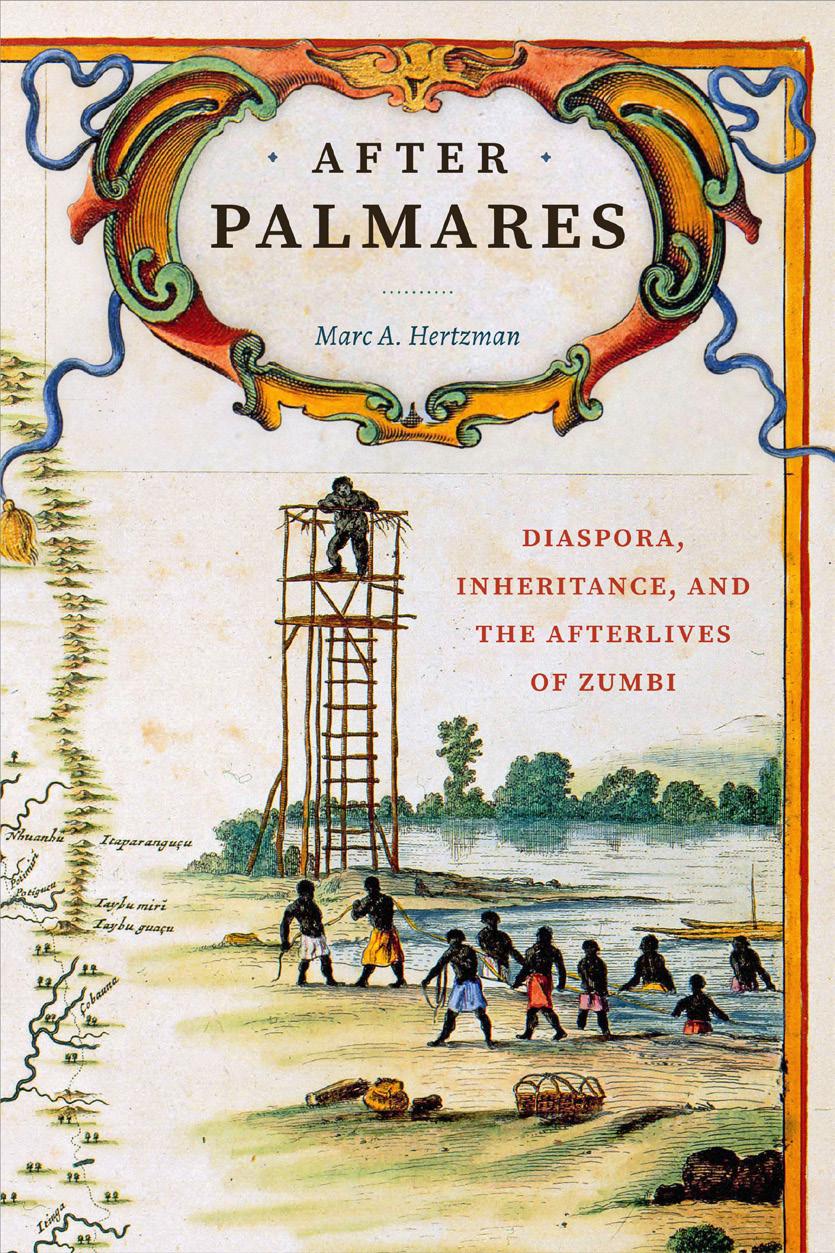
September 488 pages, 38 illustrations paper, 978-1-4780-3052-2 $32.95/£27.99 cloth, 978-1-4780-2631-0 $119.95/£107.00
Marc A. Hertzman is Associate Professor of History at the University of Illinois Urbana-Champaign and author of Making Samba: A New History of Race and Music in Brazil, also published by Duke University Press.
Latin American history/African diaspora/Slavery
41
November 280 pages, 4 illustrations paper, 978-1-4780-3111-6 $27.95/£23.99 cloth, 978-1-4780-2687-7 $104.95/£94.00
Anthropology/Gender studies/Queer theory
Survival of a Perverse Nation
Morality
and Queer Possibility in Armenia
TAMAR SHIRINIAN
In Survival of a Perverse Nation, Tamar Shirinian traces two widespread rhetorics of perversion—sexual and moral—in postsocialist Armenia, showing how they are tied to anxieties about the nation’s survival. In her fieldwork with Armenians, Shirinian found that right-wing nationalists’ focus on sexual perversion centers the figure of the homosexual, while questions of moral perversion surround oligarchs and other members of the political economic elite. While the homosexual is seen as non- or improperly reproductive, the oligarch’s moral deviations from the caring and paternalistic expectations associated with national leadership also endanger Armenia’s survival. Shirinian shows how both figures threaten the nation’s proper social reproduction, a source of great anxiety for a nation whose primary point of identity is surviving genocide. In the existential threat posed by these forms of perversion Shirinian finds paths where non-survival might mean the creation of futures that are queerer and more just. Detailing how the language of perversion offers trenchant critiques of capitalism as a perversion of life, Shirinian presents a new queer theory of political economy.
Tamar Shirinian is Assistant Professor of Anthropology at the University of Tennessee.

September 208 pages paper, 978-1-4780-3082-9 $25.95/£21.99 cloth, 978-1-4780-2658-7 $99.95/£90.00
Sociology/Health and medicine/Science and technology studies
On Addiction
Insights from History, Ethnography, and Critical Theory
DARIN
WEINBERG
Mainstream addiction science either sees addiction as a biomedical disease that renders one incapable of self-control, or as a voluntary practice engaged in freely. In On Addiction, Darin Weinberg shows how this dynamic is deeply influenced by a series of binaries (free will/determinism, mind/body, objectivity/subjectivity) that hinder our understanding of addiction. Here, he offers a new theorization of addiction in which he breaks down these contradictions and incompatibilities, calling into question the taken-for-granted distinction between the “biological” and the “social”. To the extent that it is understood as a loss of self-control over one’s behavior, addiction, Weinberg contends, requires a supple theoretical framework that provides for movements into and out of self-control, the social and natural processes that influence these movements, the historical contexts within which they occur and the ethical ramifications of taking them seriously. To create this framework, Weinberg brings together history, ethnography, and critical theory as well as the clinical and social sciences. In this way, Weinberg takes a more holistic approach to examining the fundamental nature and ethics of addiction.
Darin Weinberg is a Professor in the Department of Sociology at the University of Cambridge and a Professorial Fellow of King’s College, Cambridge. He is the author of Contemporary Social Constructionism: Key Themes and Of Others Inside: Insanity, Addiction, and Belonging in America.

42
The Banality of Good
The UN’s Global Fight against Human Trafficking LIEBA FAIER
In The Banality of Good, Lieba Faier examines why contemporary efforts to curb human trafficking have fallen so spectacularly short of their stated goals despite well-funded campaigns by the United Nations and its member state governments. Focusing on Japan’s efforts to enact the UN’s counter-trafficking protocol and assist Filipina migrants working in Japan’s sex industry, Faier draws from interviews with NGO caseworkers and government officials to demonstrate how these efforts disregard the needs and perspectives of those they are designed to help. She finds that these campaigns tend to privilege bureaucracies and institutional compliance, resulting in the compromised quality of life, repatriation, and even criminalization of human trafficking survivors. Faier expands on Hannah Arendt’s idea of the “banality of evil” by coining the titular “banality of good” to describe the reality of the UN’s fight against human trafficking. Detailing the protocols that have been put in place and evaluating their enactment, Faier reveals how the continued failure of humanitarian institutions to address structural inequities and colonial history ultimately reinforces the violent status quo they claim to be working to change.
Lieba Faier is Associate Professor of Geography and Gender Studies at the University of California, Los Angeles, and author of Intimate Encounters: Filipina Women and the Remaking of Rural Japan
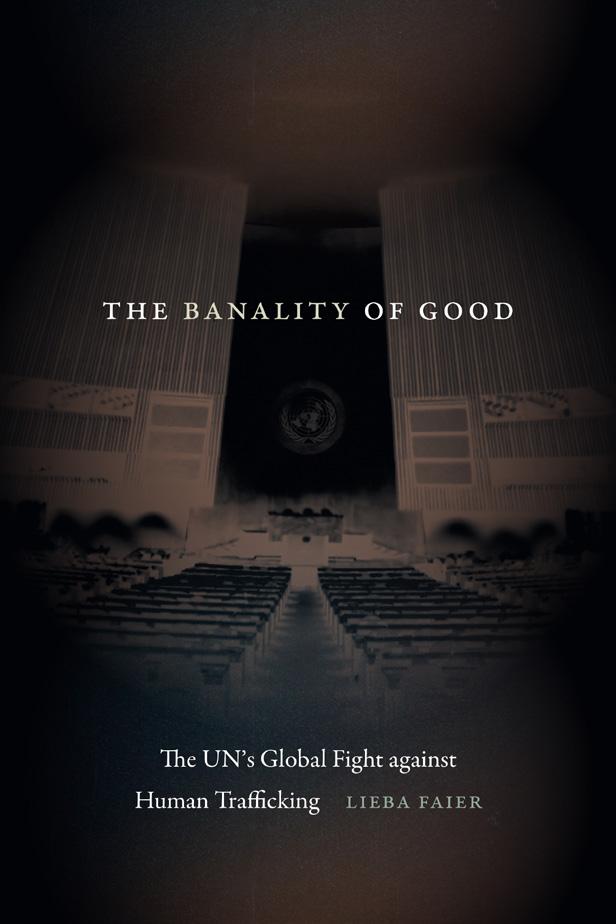
September 336 pages, 3 illustrations paper, 978-1-4780-3056-0 $28.95/£24.99 cloth, 978-1-4780-2629-7 $107.95/£97.00
South Asian studies/Colonial and postcolonial studies/Marxist theory
Ghostly Past, Capitalist Presence
A Social History of Fear in Colonial Bengal TITHI BHATTACHARYA
In Ghostly Past, Capitalist Presence, Tithi Bhattacharya maps the role that Bengali ghosts and ghost stories played in constituting the modern Indian nation, and the religious ideas seeded therein, as it emerged in dialogue with European science. Bhattacharya introduces readers to the multifarious habits and personalities of Bengal’s traditional ghosts and investigates and mourns their eventual extermination. For Bhattacharya, British colonization marked a transition from the older, multifaith folk world of traditional ghosts to newer and more frightening specters. These “modern” Bengali ghosts, borne out of a new Rationality, were homogenous specters amenable to “scientific” speculation and invoked at séance sessions in elite drawing rooms. Reading literature alongside the colonial archive, she uncovers a new reordering of science and faith from the middle of the nineteenth century. Bhattacharya argues that these shifts cemented the authority of a rising upper caste colonial elite who expelled the older ghosts in order to recast Hinduism as the conscience of the Indian nation. In so doing, Bhattacharya reveals how capitalism necessarily reshaped Bengal as part of the global colonial project.
Tithi Bhattacharya is Associate Professor of History at Purdue University, author of The Sentinels of Culture: Class, Education, and the Colonial Intellectual in Bengal, 1848–1885, and coauthor of Feminism for the 99%: A Manifesto
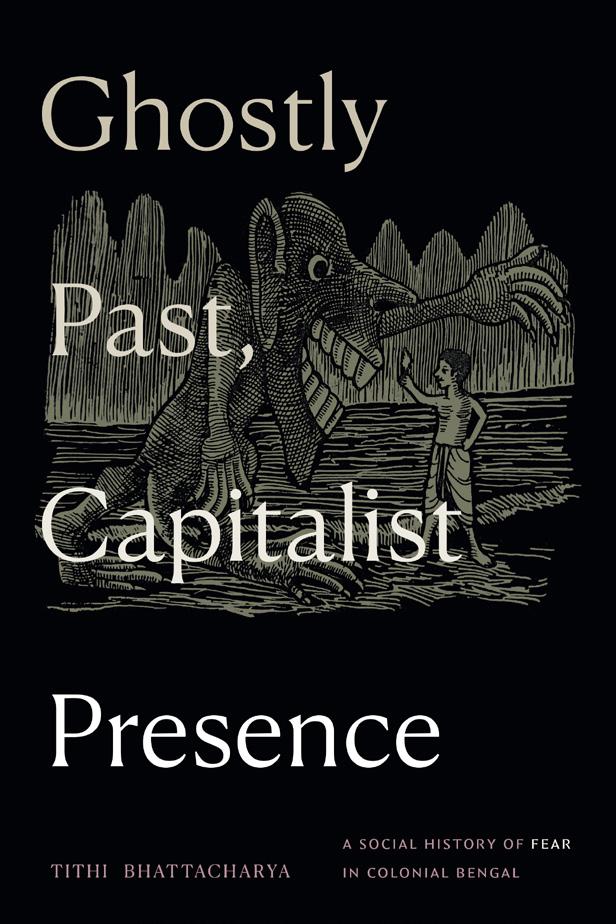
August 232 pages, 6 illustrations paper, 978-1-4780-3071-3 $26.95/£22.99 cloth, 978-1-4780-2646-4 $102.95/£92.00
Anthropology/Gender studies/Asian studies
43
August 440 pages, 46 illustrations paper, 978-1-4780-3019-5 $31.95/£27.99 cloth, 978-1-4780-2594-8 $117.95/£106.00
The Book of Politics
China in Theory
MICHAEL DUTTON
In The Book of Politics, Michael Dutton offers an affective theorization of the political and a political theorization of affect. Drawing on Western and Chinese social theory and practice, Dutton rethinks Carl Schmitt’s insistence that the political can only be thought within the antagonistic pairing of friend and enemy. Dutton shows how the power of the friend/enemy binary must be understood by conceptualizing the political as the channeling, harnessing, and transforming of affective energy flows in relation to that binary. Given this affective nature of politics, Dutton contends that to rethink the political means moving away from a political science toward an art of the political. Such an art highlights fluidity and pulls away from Eurocentric political theory, requiring a conceptualization of the political as global. He juxtaposes ancient Chinese cosmology, medicine, and Maoism against the monuments of early capitalist modernity such as the Crystal Palace and the Eiffel Tower to highlight the differences in political investments and intensities. From the Chinese revolution to the global rise of right-wing movements, Dutton rethinks politics in the contemporary world.
ASIA-PACIFIC: CULTURE, POLITICS, AND SOCIETY
A series edited by Rey Chow, Harry Harootunian, Michael Dutton, and Rosalind C. Morris
Michael Dutton is Professor of Literature at Beijing Capital Normal University and Professor of Politics at Goldsmiths, University of London. He is the author of Policing Chinese Politics: A History, also published by Duke University Press, and coauthor of Beijing Time
Critical ethnic studies/African studies/Asian studies
Reconfiguring Racial Capitalism
South Africa in the Chinese Century
November 320 pages, 31 illustrations paper, 978-1-4780-3103-1 $28.95/£24.99 cloth, 978-1-4780-2679-2 $107.95/£97.00
MINGWEI HUANG
In Reconfiguring Racial Capitalism, Mingwei Huang traces the development of new forms of racial capitalism in the twenty-first century. Through fieldwork in one of the “China malls” that has emerged along Johannesburg’s former mining belt, Huang identifies everyday relations of power and difference between Chinese entrepreneurs and African migrant workers in these wholesale shops. These relations, Huang contends, replicate and perpetuate global structures of white supremacy, anti-Blackness, capitalism, and colonialism, even when whiteness is not present. Huang argues that this dynamic reflects the sedimented legacies and continued operation of white supremacy and colonialism, which have been transformed in the shift of capitalism’s center of gravity toward China and the global South. These new forms of racial capitalism and empire layer onto and extend histories of exploitation and racialization in South Africa. Taking a palimpsestic approach, Huang offers tools for understanding this shift and de-centering contemporary Western conceptions of race, empire, and racial capitalism in the Chinese Century.
Mingwei Huang is Assistant Professor of Women’s, Gender, and Sexuality Studies at Dartmouth College.
Political theory/Asian studies
44
Plantation Worlds
MAAN BARUA
In Plantation Worlds, Maan Barua interrogates debates on planetary transformations through the histories and ecologies of plantations. Drawing on long-term research spanning fifteen years, Barua presents a unique ethnography attentive to the lives of both people and elephants amid tea plantations in the Indian state of Assam. In the nineteenth and early twentieth centuries, nearly three million people were brought in to Assam’s plantations to work under conditions of indenture. Plantations dramatically altered the region’s landscape, plundered resources, and created fraught worlds for elephants and people. Their extractive logics and colonial legacies prevail as durations, forging the ambit of infrastructures, labor, habitability, and conservation in the present. And yet, as the perspectives of the Adivasi plantation worker community and lifeworlds of elephants show, possibilities for enacting a decolonial imaginary of landscape remain present amid immiseration. From the margins of the global South, Barua offers an alternative grammar for articulating environmental change. In so doing, he prompts a rethinking of multispecies ecologies and how they are structured by colonialism and race.
Maan Barua is University Lecturer in Human Geography at the University of Cambridge and author of Lively Cities: Reconfiguring Urban Ecology
Anthropology/Asian studies
State of Fear
Policing a Postcolonial City
JOSHUA BARKER
In State of Fear, Joshua Barker reckons with how fear and violence are produced and reproduced through everyday practices of rule and control. Examining the ethnographic and historical genealogies of Indonesian policing, Barker focuses on the city of Bandung, which is permeated by anxieties about security, all in spite of the fact that it’s a relatively safe city according to the data. Drawing from his fieldwork there during the latter years of the authoritarian New Order regime, Barker traces the complex relationship between the state and vigilante groups like neighborhood watch patrols and street gangs. Through interviews with police officers, vigilantes, and street-level toughs, he uncovers a struggle between two visions of social control that continues to animate policing in Indonesia: the modern, bureaucratic approach favored by the state, and a territorial approach that divides the city into fiefdoms overseen by charismatic individuals of authority. Synthesizing insights from in-depth ethnographic, historical, and theoretical work, Barker reveals how authoritarianism can take root not just from the top down but also the bottom up.
Joshua Barker is Professor of Anthropology at University of Toronto and coeditor of Figures of Southeast Asian Modernity and State of Authority: State in Society in Indonesia
August 320 pages, 35 illustrations paper, 978-1-4780-2561-0 $28.95/£24.99 cloth, 978-1-4780-2086-8 $107.95/£97.00
September 328 pages, 10 illustrations paper, 978-1-4780-3076-8 $28.95/£24.99 cloth, 978-1-4780-2652-5 $107.95/£97.00
Anthropology/Environment/South Asia
45
November 320 pages, 14 illustrations paper, 978-1-4780-3110-9 $28.95/£24.99 cloth, 978-1-4780-2684-6 $107.95/£97.00
Infrastructural Attachments
Austerity, Sovereignty, and Expertise in Kenya
EMMA PARK
Set against critiques of neoliberal capitalism in the present, Infrastructural Attachments argues that the technopolitics of austerity have been the organizing logic of statecraft in Kenya since the late nineteenth century, calling into question the novelty of austerity as a mode of governance and a lived experience. Using infrastructures as a lens to explore state formation over the long twentieth century—roads in the early colonial period, radio broadcasting from interwar through the postwar period, and mobile phones and digital financial services in the present—historian Emma Park reveals that as the state drew on private capital to make up for limited budgets it inaugurated a peculiar political-economic form: the corporate-state. For more than a century—in pursuit of minimizing costs and maximizing profits—the corporate-state crucially relied on the exploitation and expropriation of its subject-citizens. By foregrounding these workers, Park interrogates how Kenyans’ knowledge and expertise has been rescaled and subsumed, quietly underwriting the development of infrastructural expertise, the circuits of finance upon which (post)colonial infrastructural expansion has been premised, and the forms of profit-making it has enabled.
Emma Park is Assistant Professor of History at The New School.
African studies/Legal history/Decolonial studies
Soldier’s Paradise
Militarism
in Africa after Empire
October 304 pages, 7 illustrations paper, 978-1-4780-3083-6 $28.95/£24.99 cloth, 978-1-4780-2659-4 $107.95/£97.00
SAMUEL FURY CHILDS DALY
In Soldier’s Paradise, Samuel Fury Childs Daly tells the story of how Africa’s military dictators tried to transform their societies into martial utopias, and failed. Across the continent, independence was followed by a wave of military coups and revolutions. The soldiers who led them had a vision. In Nigeria and other former British colonies, officers governed like they fought battles—to them, politics was war by other means. Civilians were subjected to military-style discipline, which was indistinguishable from tyranny. Soldiers promised law and order, and they saw judges as allies in their mission to make society more like an army. But law was not the disciplinary tool they thought it was. Using legal records, archival documents, and memoirs, Daly shows how law both enabled militarism and worked against it. For Daly, the law is a place to see decolonization’s tensions and ironies—independence did not always mean liberty, and freedom had a militaristic streak. In a moment when militarism is again on the rise in Africa, Daly describes not just where it came from, but why it lasted so long.
Samuel Fury Childs Daly is Associate Professor of History at the University of Chicago and author of A History of the Republic of Biafra: Law, Crime, and the Nigerian Civil War
African studies
46
Reproductive Labor and Innovation
Against the Tech Fix in an Era of Hype
JENNIFER DENBOW
In Reproductive Labor and Innovation, Jennifer Denbow examines how the push toward techno-scientific innovation in contemporary American life often comes at the expense of the care work and reproductive labor that is necessary for society to function. Noting that the gutting of social welfare programs has shifted the burden of solving problems to individuals, Denbow argues that the aggrandizement of innovation and the degradation of reproductive labor are intertwined facets of neoliberalism. She shows that the construction of innovation as a panacea to social ills justifies the accumulation of wealth for corporate innovators and the impoverishment of those feminized and racialized people who do the bulk of reproductive labor. Moreover, even innovative technology aimed at reproduction— such as digital care work platforms and noninvasive prenatal testing—obscure structural injustices and further devalue reproductive labor. By drawing connections between innovation discourse, the rise of neoliberalism, financialized capitalism, and the social and political degradation of reproductive labor, Denbow illustrates what needs to be done to destabilize the overvaluation of innovation and to offer collective support for reproduction.
Jennifer Denbow is Associate Professor of Political Science at California Polytechnic State University, San Luis Obispo, and the author of Governed through Choice: Autonomy, Technology, and the Politics of Reproduction
Science studies/History and philosophy of science
Laboratory Epistemologies
A Hands-On Perspective
JENNY BOULBOULLÉ
In Laboratory Epistemologies: A Hands-On Perspective, Jenny Boulboullé examines the significance of hands-on experiences in contemporary life science laboratories. Addressing the relationship between contemplation and manipulation in epistemology, Boulboullé combines participant observations in molecular genetics labs and microbiological cleanrooms with a long durée study of the history and philosophy of science. She radically rereads Descartes’ key epistemological text Meditations on First Philosophy, reframing the philosopher as a hands-on knowledge maker. With this reading, Boulboullé subverts the pervasive modern conception of the disembodied knower and puts the hands-on experimenter at the heart of life sciences research. In so doing, she contributes a theoretical model to understanding how life processes on cellular and molecular levels is manually produced in today’s techno-scientific spaces. By reassessing the Cartesian legacy and arguing that epistemology should be grounded in the standpoint of a hands-on practitioner, Boulboullé offers the philosophical and historical groundwork to understand and study contemporary life sciences research as multisensory embodied practices.
EXPERIMENTAL FUTURES: TECHNOLOGICAL LIVES, SCIENTIFIC ARTS, ANTHROPOLOGICAL VOICES
A series edited by Michael M. J. Fischer and Joseph Dumit
Jenny Boulboullé is a Lecturer in the Art and Culture Department at the University of Amsterdam.
November 232 pages, 3 illustrations paper, 978-1-4780-3099-7 $26.95/£22.99 cloth, 978-1-4780-2678-5 $102.95/£92.00
November 352 pages, 35 illustrations paper, 978-1-4780-3096-6 $29.95/£25.99 cloth, 978-1-4780-2675-4 $109.95/£98.00
Gender studies/Science and technology studies/Political theory
47
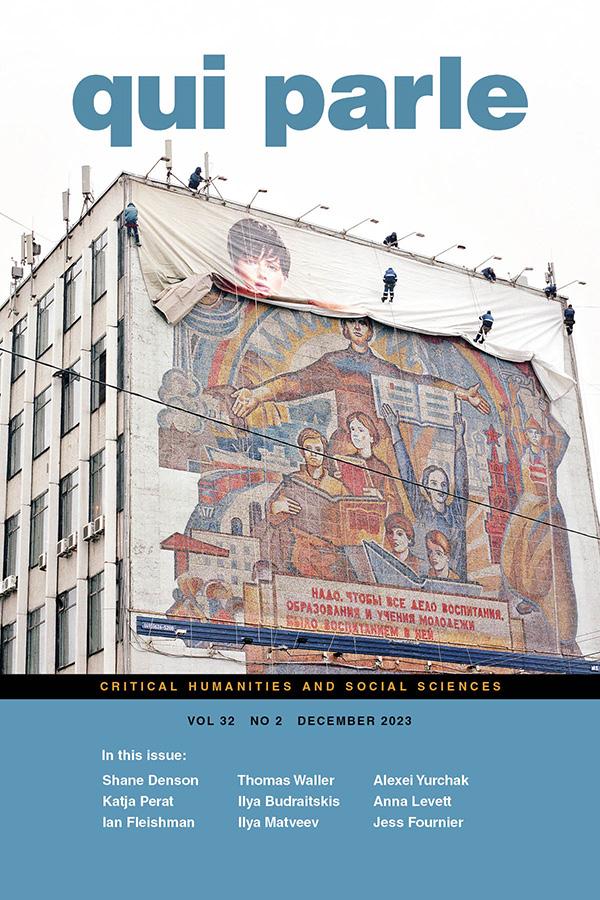
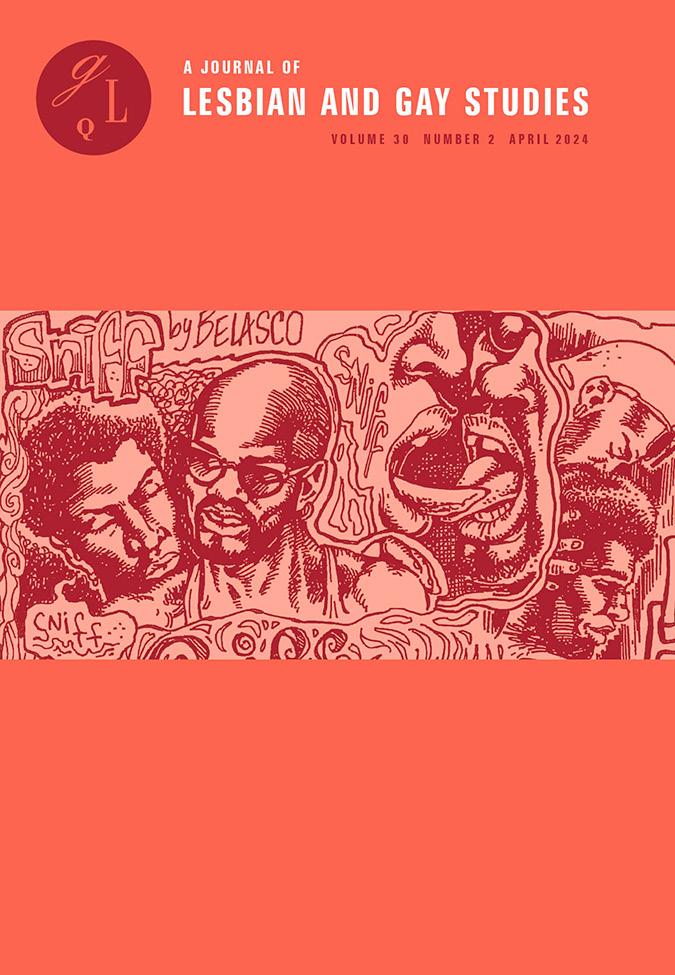
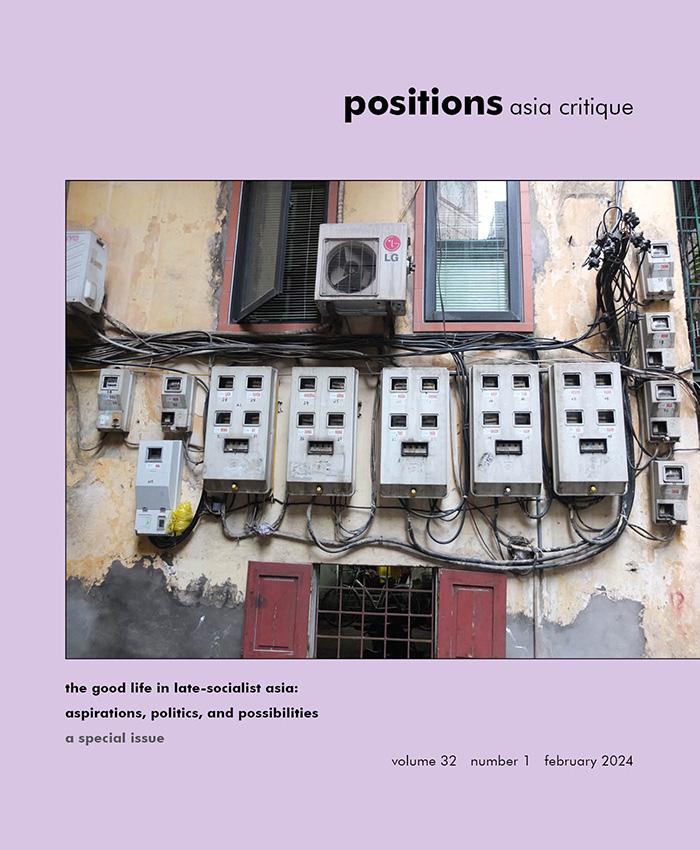
Agricultural History
Albert Way, editor
Quarterly
Official journal of the Agricultural History Society
American Literature
Priscilla Wald and Matthew Taylor, editors
Quarterly
American Speech
A Quarterly of Linguistic Usage
Thomas Purnell, editor
Quarterly, plus annual supplement
Official journal of the American Dialect Society
Archives of Asian Art
Patricia Berger, editor
Two issues annually
boundary 2
an international journal of literature and culture
Arne De Boever, Leah Feldman, R. A. Judy, Kara Keeling, and Christian Thorne, editors
Quarterly
Camera Obscura
Feminism, Culture, and Media Studies
Bishnupriya Ghosh, Lalitha
Gopalan, Lynne Joyrich, Homay
King, Bliss Cua Lim, Constance
Penley, Tess Takahashi, Patricia White, and Sharon Willis, editorial collective
Three issues annually
Common Knowledge
Jeffrey M. Perl , editor
Three issues annually
Comparative Literature
Michael Allan, editor
Quarterly
Comparative Studies of South Asia, Africa and the Middle East
Manan Ahmed, Marwa Elshakry, and Steven Pierce, editors
Three issues annually
Critical AI
Lauren M. E. Goodlad, editor
Two issues annually
Critical Times
Interventions in
Global Critical Theory
Samera Esmeir, editor
Three issues annually
Open access
Cultural Politics
Ryan Bishop, Mark Featherstone, Eva Haifa Giraud, and Douglas Kellner, editors
Three issues annually
Demography
Sara R. Curran, editor
Six issues annually
Subscribe to Open Official journal of the Population Association of America differences
A Journal of Feminist Cultural Studies
Elizabeth Weed, Ellen Rooney, and Denise Davis, editors
Three issues annually
Duke Mathematical Journal
Alexander Kiselev and Hubert L. Bray, editors Eighteen issues annually
Eighteenth-Century Life
Cedric D. Reverand II and Michael Edson, editors
Three issues annually
English Language Notes
Nan Goodman, editor
Two issues annually
Environmental Humanities
Dolly Jørgensen and Franklin Ginn, editors
Three issues annually
Open access
Ethnohistory
Denise I. Bossy and Robert C. Schwaller, editors Quarterly
Official journal of the American Society for Ethnohistory
French Historical Studies
Christine Haynes and Jennifer Ngaire Heuer, editors Quarterly
Official journal of the Society for French Historical Studies
Genre
Forms of Discourse and Culture
James Zeigler and Justin Sider, editors
Three issues annually
GLQ
A Journal of Lesbian and Gay Studies
Chandan Reddy and C. Riley Snorton, editors Quarterly
Hispanic American Historical Review
Lauren H. Derby, Katherine M. Marino, Elizabeth O'Brien, Fernando Pérez-Montesinos, William Summerhill, and Kevin Terraciano, editors Quarterly
History of Political Economy
Kevin D. Hoover, editor
Five issues annually, plus annual supplement
History of the Present
A Journal of Critical History
Joan Wallach Scott and Brian Connolly, editors Two issues annually
Illinois Journal of Mathematics
Steven Bradlow, editor Quarterly
Journal of Asian Studies
Joseph S. Alter, editor
Quarterly
Official journal of the Association for Asian Studies
Journal of Chinese Literature and Culture
Xingpei Yuan and Zong-qi Cai, editors
Two issues annually
Journal of Health Politics, Policy and Law
Jonathan Oberlander, editor
Six issues annually
Journal of Korean Studies
Jisoo M. Kim, editor
Two issues annually
journal subscriptions 48
Journal of Medieval and Early Modern Studies
David Aers and Sarah Beckwith, editors
Michael Cornett, managing editor
Three issues annually
Journal of Middle East Women’s Studies
Soha Bayoumi, editor
Three issues annually
Official journal of the Association for Middle East Women’s Studies
Journal of Music Theory
Richard Cohn, editor
Two issues annually
Kyoto Journal of Mathematics
Osamu Fujino and Koji Fujiwara, editors Quarterly
Labor
Studies in Working-Class History
Julie Greene, editor Quarterly
Official journal of the Labor and Working-Class History Association
liquid blackness
journal of aesthetics and black studies
Alessandra Raengo and Lauren McLeod Cramer, editors
Two issues annually
Open access
Meridians
feminism, race, transnationalism
Ginetta E. B. Candelario, editor Two issues annually
the minnesota review a journal of creative and critical writing
Janell Watson, editor Two issues annually
Modern Language Quarterly
A Journal of Literary History
Jeffrey Todd Knight, editor Quarterly
Monsoon
Journal of the Indian Ocean Rim
Rogaia Mustafa Abusharaf and Jeremy Prestholdt, editor
Two issues annually
New German Critique
An Interdisciplinary Journal of German Studies
NGC Editorial Collective, editors
Three issues annually
Nka
Journal of Contemporary African Art
Salah M. Hassan and Chika Okeke-Agulu, editors
Two issues annually
Notre Dame Journal of Formal Logic
Curtis Franks and Anand Pillay, editors Quarterly
Novel
A Forum on Fiction
Kevin McLaughlin, editor
Three issues annually
Official journal of the Society for Novel Studies
Pedagogy
Critical Approaches to Teaching Literature, Language, Composition, and Culture
Jennifer L. Holberg and Marcy M. Taylor, editors Three issues annually
The Philosophical Review
Faculty of the Sage School of Philosophy at Cornell University, editors Quarterly
Poetics Today
International Journal for Theory and Analysis of Literature and Communication
Milette Shamir and Irene Tucker, editors Quarterly
positions asia critique
Suzy Kim, editor Quarterly
Prism
Theory and Modern Chinese Literature
Zong-qi Cai, editor Three issues annually
Public Culture
Arjun Appadurai, Vyjayanthi Rao, and Erica RoblesAnderson, editors Three issues annually
QTR: A Journal of Trans and Queer Studies in Religion
Joseph A. Marchal and Melissa M. Wilcox, editors Two issues annually Open access
Qui Parle
Critical Humanities and Social Sciences
Editorial Board of Qui Parle, editors Two issues annually
Radical History Review
RHR Editorial Collective, editors Three issues annually
Romanic Review
Elisabeth Ladenson, editor Three issues annually
Small Axe
A Caribbean Journal of Criticism
David Scott, editor Three issues annually
Social Text
Jonathan Beller, Jayna Brown, and David Sartorius, editors Quarterly
South Atlantic Quarterly
Michael Hardt, editor Quarterly
Sungkyun Journal of East Asian Studies
Ross King, editor Two issues annually Open access
Theater
Tom Sellar, editor Three issues annually
Trans Asia Photography
Deepali Dewan, Yi Gu, and Thy Phu, editors Two issues annually Open access
TSQ: Transgender Studies Quarterly
Dylan McCarthy Blackston, micha cardenás, Ciara Cremin, Francisco J. Galarte, and Abraham B. Weil , editors Quarterly
Twentieth-Century
Literature
Lee Zimmerman, editor Quarterly


Ordering Information
Duke University Press journals are available to bookstores through standing order; call 888.651.0122. For information on ordering individual subscriptions (including postage rates for subscriptions outside of the United States) or to order individual back issues, call 888.651.0122 (within the United States and Canada) or +1 919.688.5134, or email subscriptions@dukeupress.edu
journal subscriptions
49

2021, paper, $30.95/£26.99 978-1-4780-1771-4

2021, paper, $32.95/£27.99 978-1-4780-1166-8

2024, paper, $24.95tr/£21.99 978-1-4780-2572-6

2017, paper, $28.95/£24.99 978-0-8223-6319-4
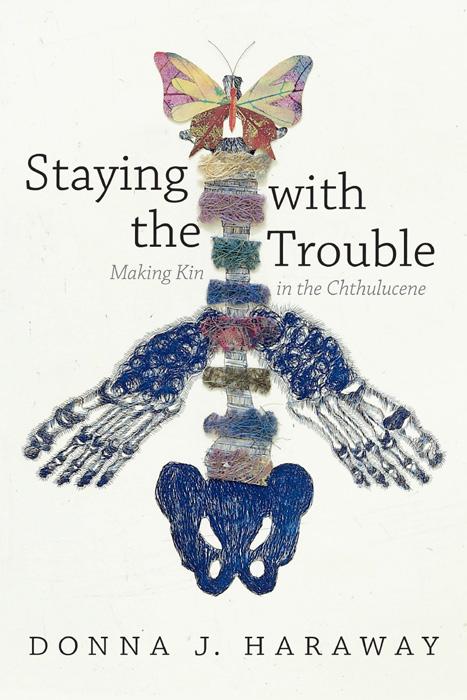
2016, paper, $28.95/£24.99 978-0-8223-6224-1

2023, paper, $27.95tr/£23.99 978-1-4780-1925-1
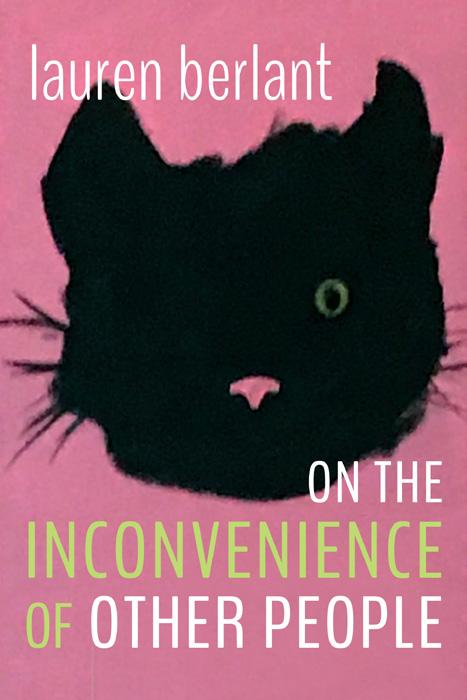
2022, paper, $25.95/£21.99 978-1-4780-1845-2

2017, paper, $24.95tr/£21.99 978-0-8223-6900-4
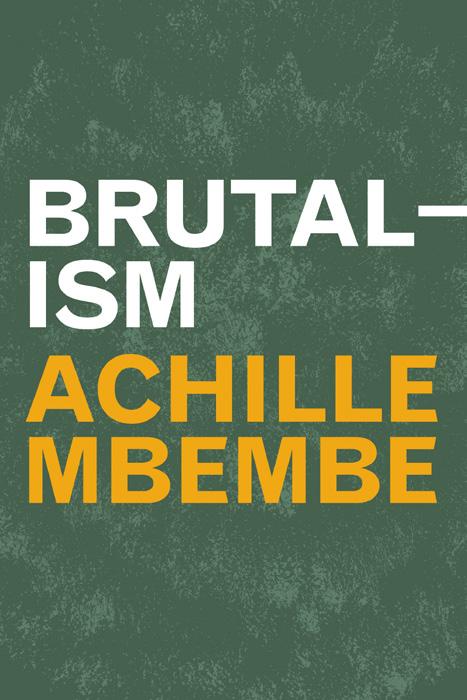
2024, paper, $25.95/£21.99 978-1-4780-2558-0

2011, paper, $26.95/£22.99 978-0-8223-5111-5
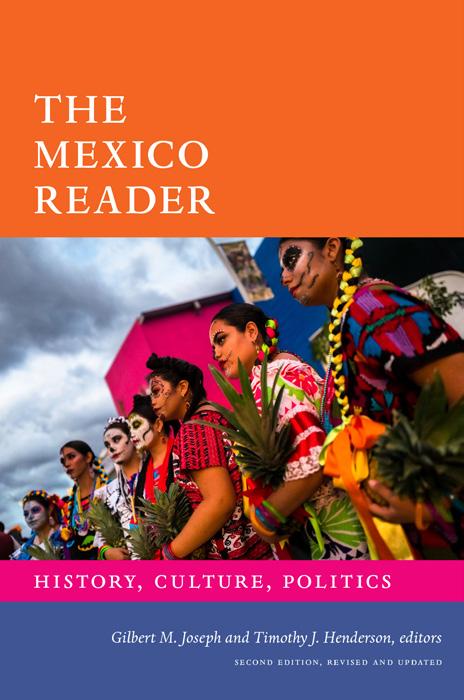
2022, paper, $33.95tr/£28.99 978-1-4780-1836-0

2024, paper, $28.95tr/£24.99 978-1-4780-2544-3
selected backlist
50

2024, paper, $15.95tr/£12.99 978-1-4780-3068-3

2016, paper, $25.95tr/£21.99 978-0-8223-6294-4

2023, paper, $32.95tr/£27.99 978-1-4780-2495-8

2023, paper, $15.95tr/£12.99 978-1-4780-1965-7

2021, paper, $19.95tr/£16.99 978-1-4780-1439-3

2023, paper, $15.95tr/£12.99 978-1-4780-1936-7

2023, paper, $19.95tr/£16.99 978-1-4780-2551-1

2023, paper, $15.95tr/£12.99 978-1-4780-1938-1

2023, paper, $19.95tr/£16.99 978-1-4780-2508-5

2024, paper, $26.95tr/£22.99 978-1-4780-2559-7
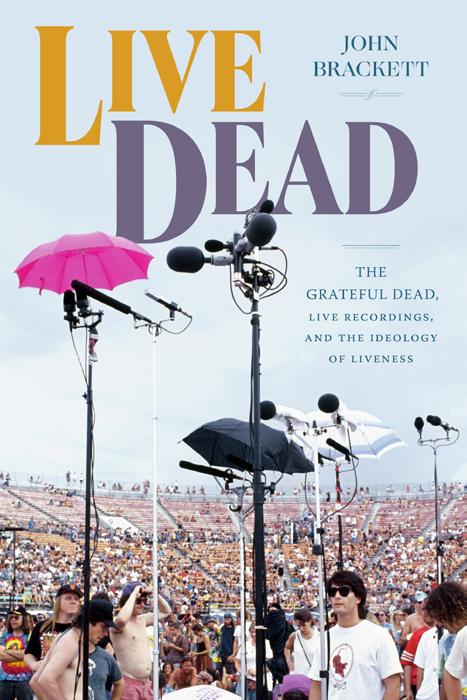
2023, paper, $26.95tr/£22.99 978-1-4780-2548-1
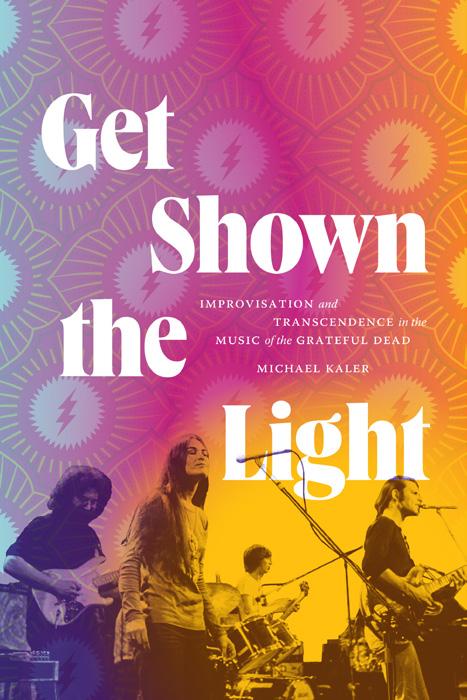
2023, paper, $28.95tr/£24.99 978-1-4780-2497-2
selected backlist
51

Finalist,

Winner,

Winner, 2023 Margaret Mead Award, Society for Applied Anthropology
Co-Winner,


Honorable
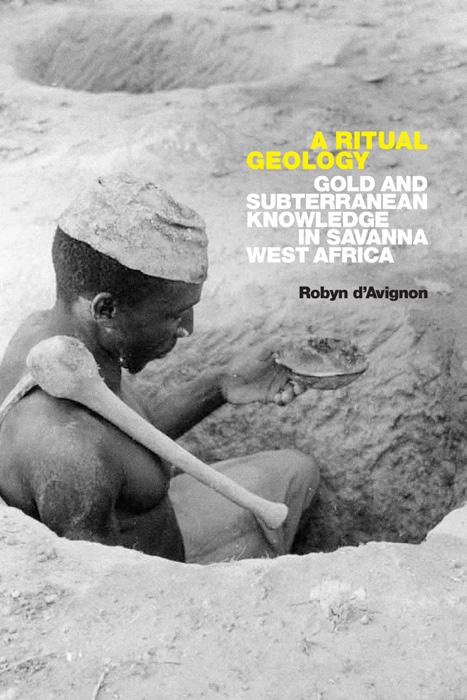
Winner, 2023 President's Book Award, Social Science History Association Winner, 2023 Pfizer Book Award, History of Science Society Co-Winner, 2023 Julian Steward Award, Anthropology and Environment Section of the American Anthropological Association

Co-Winner,

Co-Winner,

Winner, 2023
Winner,
selected recent award winners
2023 National Book Critics Circle John Leonard Prize
2024 Historians of British Art Book Prize for a single-authored book on a contemporary subject
2023 Gregory Bateson Book Prize, Society for Cultural Anthropology
Mention, 2023 James Russell Lowell Award, Modern Language Association
2023 First Book Award, Native American and Indigenous Studies Assocation
2023 Julian Steward Award, Anthropology and Environment Section of the American Anthropological Association
Winner, 2023 John Hope Franklin Book Prize, American Studies Association
52
Wesley-Logan Prize, American Historical Association
2022 Letitia Woods Brown Prize for the Best Book in African American Women's History, Association of Black Women Historians
All prices and discounts are subject to change without notice. Books are short discount except when tr, indicating trade discount, follows the price.
Returns
No authorization is required. Books in saleable condition will be credited at full invoice price if returned within two years of invoice date. Invoice information is required. Books returned beyond this time period or those returned without invoice information will be credited at 50% of list price. Permanently defaced books, for example, those marred by non-removable labels, do not meet the necessary criteria and will not be accepted. Books received in damaged or defective condition must be returned within 90 days, and the reason for the return must be clearly stated in order to receive full credit.
Please Send Returns To:
Duke University Press Warehouse 120 Golden Drive Durham, NC 27705
Orders and Inquiries
For orders: phone 888-651-0122 fax 888-651-0124
8:30–4:30 Eastern Time orders@dukeupress.edu
For editorial and other matters: phone 919-687-3600
8:30–5:00 Eastern Time
Libraries
Libraries and institutions will be billed on receipt of official purchase order.
Examination and Desk Copies
For exam or desk copies, place your request through the book or journal issue’s page on our website.
Review Copies
Book review editors and members of the media can request review copies at dukeu.press/ReviewCopy or by emailing bpublicity@dukeupress.edu.
International Licensing Inquiries
booktranslations@dukeupress.edu
Mailing Opt Out
To opt out of mailings from Duke University Press, contact orders@dukeupress.edu
Sales Representation
EASTERN AND WESTERN US
Columbia University Press Sales Consortium
Catherine Hobbs, Sales Consortium Manager phone 804-690-8529 ch2714@columbia.edu
MIDWESTERN US
Miller Trade Book Marketing Bruce Miller phone 773-275-8156 cell 773-307-3446 bruce@millertrade.com
index
Adey, Peter 27
Ahmad, Mahvish 24
Ahn, Patty 13
Amar, Paul 38
Andrade, Lisa Ubelaker 39
Armus, Diego 39
Asare, Masi 14
Barker, Joshua 45
Barry, Annabel 22
Barua, Maan 45
Beliso-De Jesús, Aisha M. 10
Bell, Gloria Jane 21
Benson, Koni 24
Bhattacharya, Tithi 43
Boulboullé, Jenny 47
Brown, Rachel H. 40
Browne, Kevin Adonis 16
Caison, Gina 31
Calhoun, Doyle D. 33
Candelario, Ginetta E. B. 24
Césaire, Aimé 9
Checa Gismero, Paloma 19
Cho, Michelle 13
Cornejo, Kency 20
Croft, Clare 15
Daly, Samuel Fury Childs 46
Das Gupta, Monisha 37
Davidson, Christina Cecelia 34
Davis, Lennard J. 30 del Carmen Carrión, María 16
Denbow, Jennifer 47
Doyle, Jennifer 7
Dutton, Michael 44
Edwards, Brent Hayes 9
Faier, Lieba 43
Feinstein, John 1
Gil, Alex 9
Gonzalez, Vernadette Vicuña 13
Greene, Nikki A. 17
Greenleaf, Maron E. 40
Grossberg, Lawrence 8
Gutterman, Lauren Jae 23
Hall, Stuart 8
Hertzman, Marc A. 41
Horton, Jessica L. 21
Huang, Mingwei 44
Hyde, Carrie 22
Jackson, Shona N. 36
Jaffe, Rivke 36
Johnston, Jill 15
Katzenstein, Inés 16
Kim, Eunsong 18
Lane, Keiko 3
Leite, Gabriela 38
Levins Morales, Aurora 4
Lomnitz, Claudio 9
Manalansan, Martin F. 23
Marchal, Joseph A. 23
Martin, Fran 24
McDuffie, Erik S. 35
Medovoi, Leerom 33
Mol, Annemarie 32
Morgenstern, Hana 24
Myers, Fred R. 18
Nájera, Jennifer R. 6
Nash, Jennifer C. 5
Nebolon, Juliet 27
Negrón, Marisol 12
Neutill, Rani 13
Nguyen, Mimi Thi 13
Nuttall, Sarah 20
Oberman, Miller 11
Okihiro, Gary Y. 37
Park, Emma 46
pearson, heath 29
Potts, Shaina 28
Ritts, Max 31
Rivera-Rideau, Petra R. 12
CANADA
Lexa Publishers’ Representatives
Mical Moser phone 718-781-2770
micalmoser@me.com
Fulfillment and Distribution University of Toronto Press Distribution Division 5201 Dufferin Street
Toronto, ON M3H 5T8
Tel: 416-667-7791
Fax: 416-667-7832
Toll Free: 1-800-565-9523
Toll Free Fax: 1-800-221-9985 utpbooks@utpress.utoronto.ca
ALL OTHER INTERNATIONAL SALES AND DISTRIBUTION
Combined Academic Publishers, Ltd. (CAP)
phone 44 (0) 1423 526350 combinedacademic.co.uk enquiries@combinedacademic.co.uk (Books are stocked in the UK and are available at sterling prices.)
Roach, Shoniqua 23
Ruiz, Sandra 11
Saggese, Jordana Moore 17
Saville, Alphonso F., IV 34
Savonick, Danica 6
Shirinian, Tamar 42
Smith, Terry 18
Sostaita, Barbara Andrea 28
Spires, Derrick R. 22
Stardust, Zahra 25
Stein, Jordan Alexander 14
Stryker, Susan 2
Stutterheim, Sydney 19
Tawadros, Gilane 8
Troeung, Y-Dang 26
Turner, Madeline Murphy 16
Vider, Stephen 23
Wark, McKenzie 2
Weeks, Meg 38
Weinberg, Darin 42
Whatcott, Jess 30
Wilcox, Melissa M. 23
Wong, Yutian 13
sales information
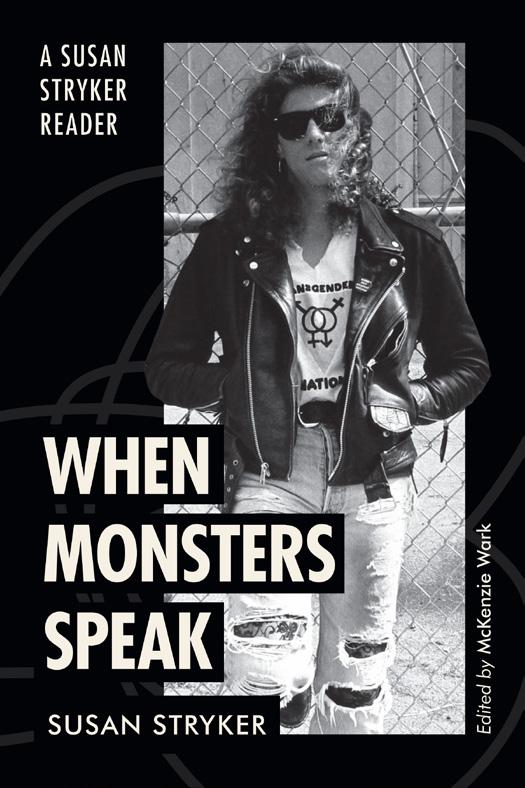

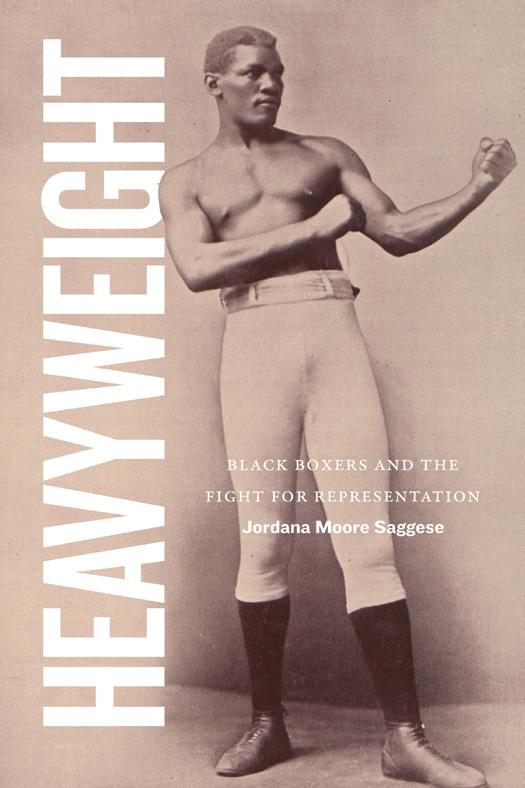


54 Box 90660 Durham, North Carolina 27708–0660 Nonprofit Organization US Postage PAID Durham, NC Permit No. 1055 dukeupress.edu Featured Titles






































































































